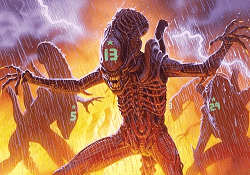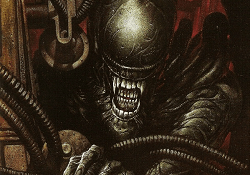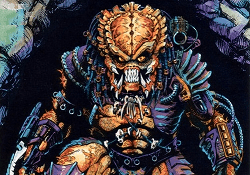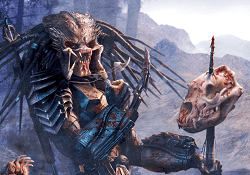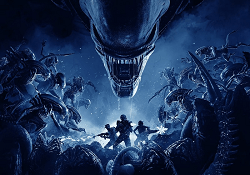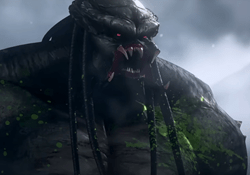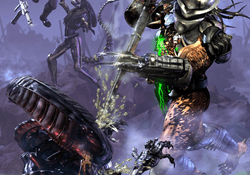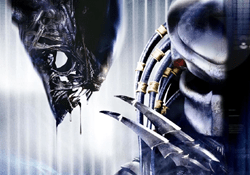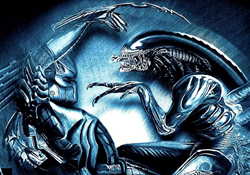Xenomorph Types: List Of All Alien Subspecies And Variants
Here is a comprehensive list of all Xenomorph types from the Alien movies and beyond, including the facehugger, chestburster, warrior, and Queen Xenomorph variants. The Xenomorph appearances and behavior vary based on the type of the host but also in the placement of the creatures in the Alien lifecycle. As a bonus, many better-known types from the games and comic books are included which often show up in a Xenomorph types chart or Xenomorph wiki. Overall, there are about a dozen different Xenomorphs from the movies and more than fifty from the expanded universe.
Egg
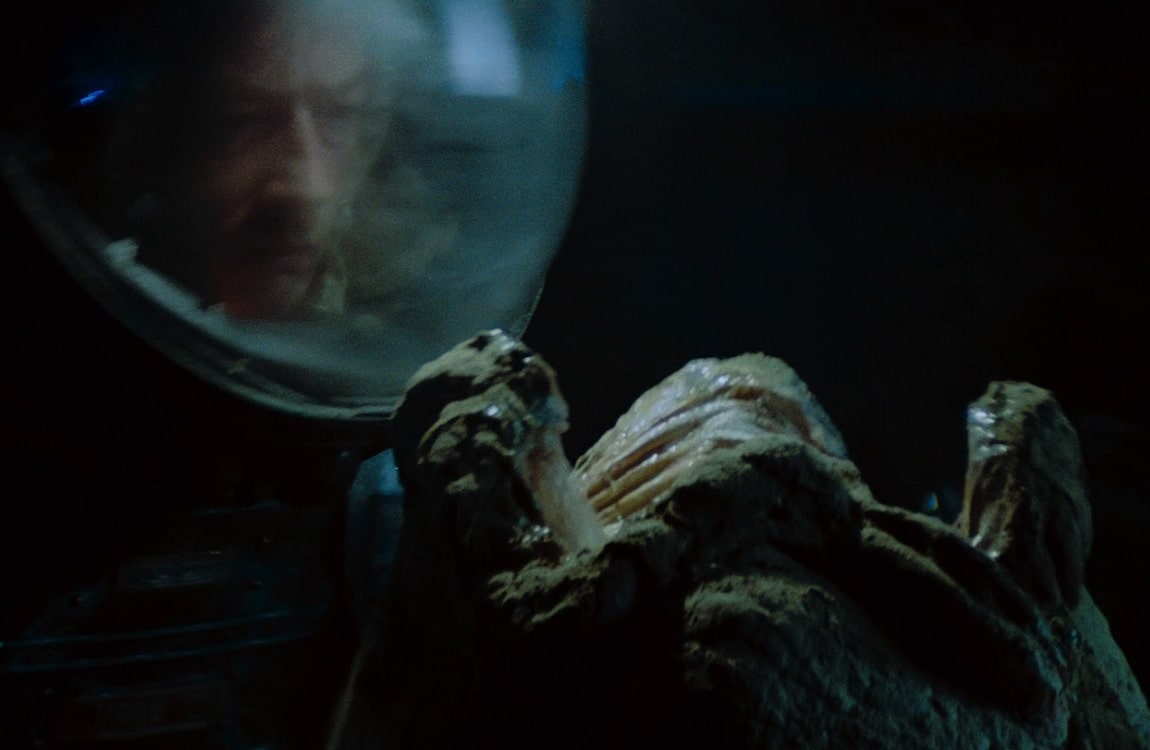
The egg (also known as the Ovomorph) is where the Xenomorph evolution begins. Featured in all Alien movies (except Prometheus) this leathery orb will cause big trouble if you get too close. Supposedly, it detects movement, vibrations in the ground and even your scent to activate the facehugger inside. Eggs can survive for thousands of years and probably bleed acid if hurt, an important trait of the Xenomorph anatomy. They come in different sizes and the Aliens can use them as traps in chokepoints.

Facehugger
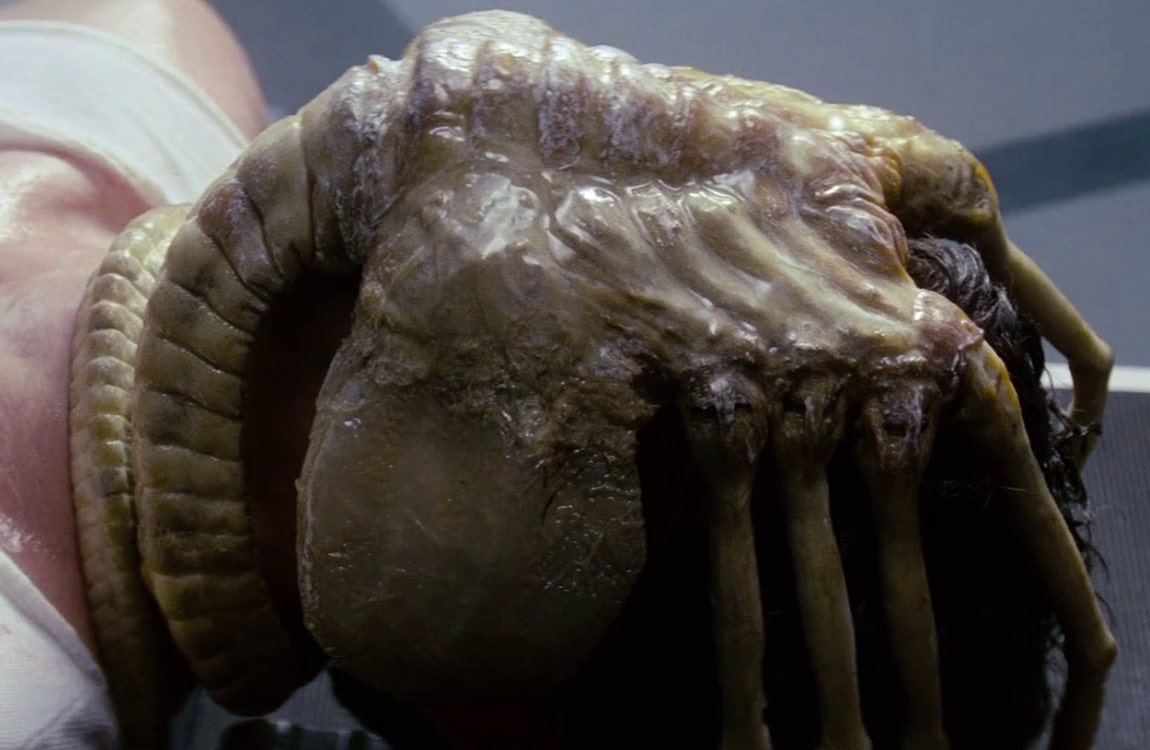
The next stage in the Xenomorph lifecycle, this crab-like creature will latch on to the nearest host. It doesn't matter if it's a human, an animal, a Predator or even an Space Jockey. It will wrap its fingers around the victim's face and tail around the neck. Facehuggers are almost impossible to remove and will kill the victim in the process. It will come off and die after successfully implanting the embryo.
Royal Facehugger
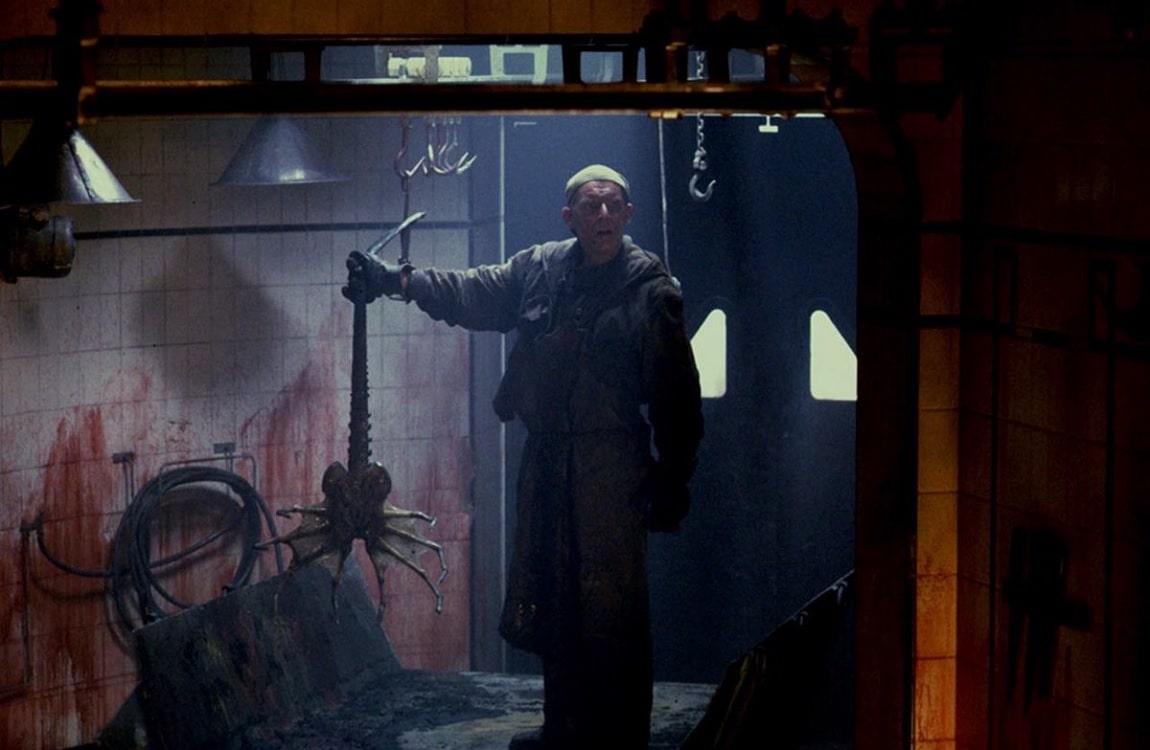
This special facehugger is bigger than the regular one and contains a queen embryo. The queen embryo takes a longer time to hatch than a regular one. In addition, the royal facehugger (also known as a Super Facehugger) can contain a Xenomorph warrior embryo designated to protect the Queen. It also has a flipper-like legs and darker skin giving it an aquatic presence.

Chestburster
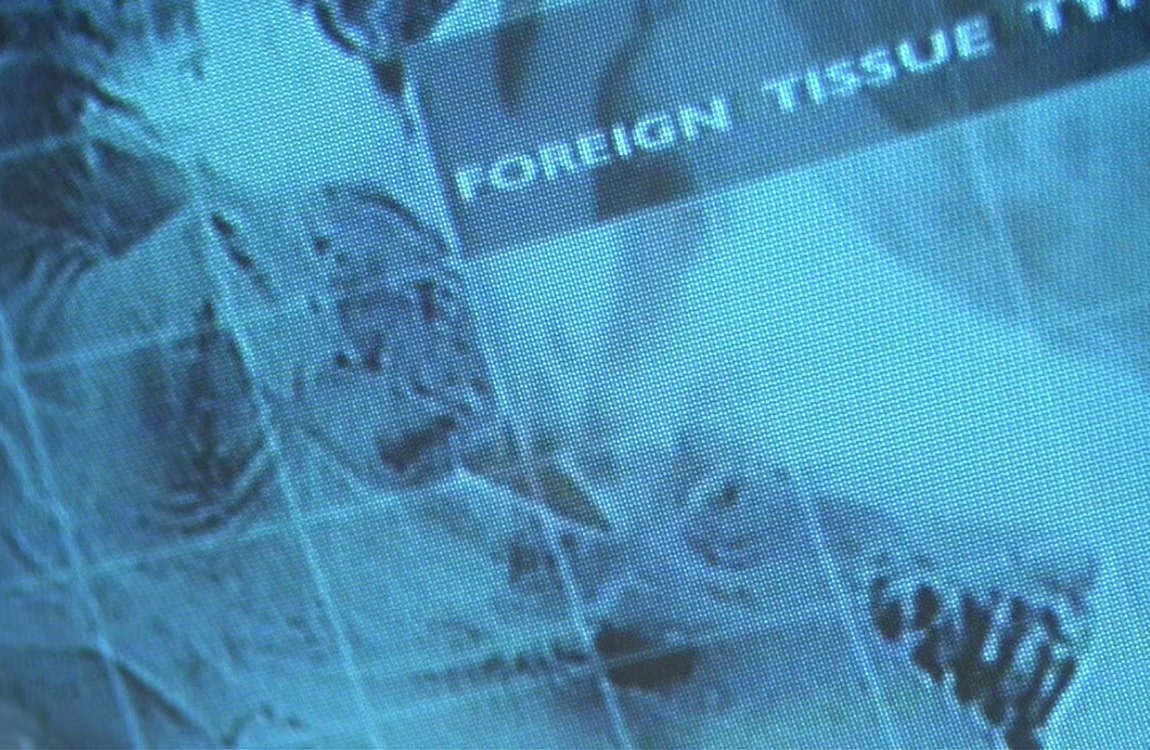
The chestburster is an infant Xenomorph who is freshly born from a host by biting through the ribcage. It has a small size, no limbs (or very short limbs) and light skin. In a few hours, it will shed its skin and grow rapidly. It is still very aggressive and can attack if provoked. Otherwise, it will try to hide until fully grown.
Xenomorph Warrior
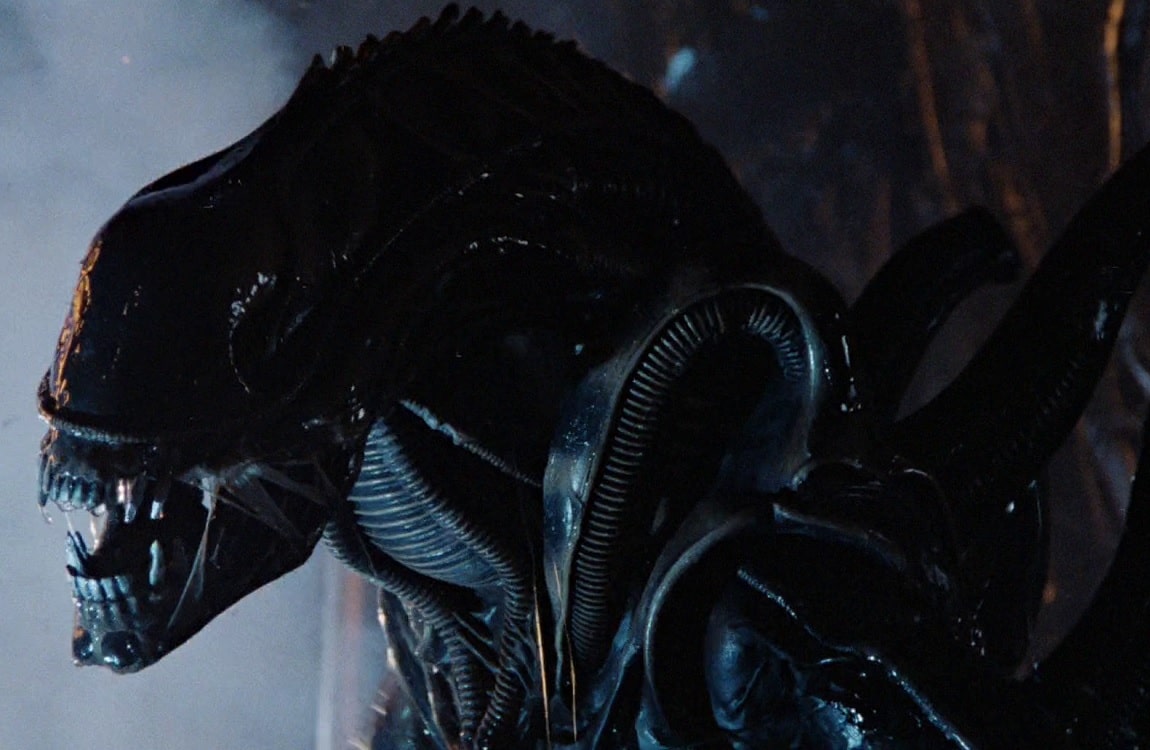
This is probably the most common Xenomorph type and it is "produced" in large numbers. The Alien warriors can have slightly different appearances, but tend to have ridged heads. Lone warriors usually resort to using stealth, but they will attack en masse when there are sufficient numbers available. They use their inner mouths, claws and tail to attack. Often they choose to capture instead of killing their victims to enlarge the numbers of the Alien hive.
Xenomorph Drone
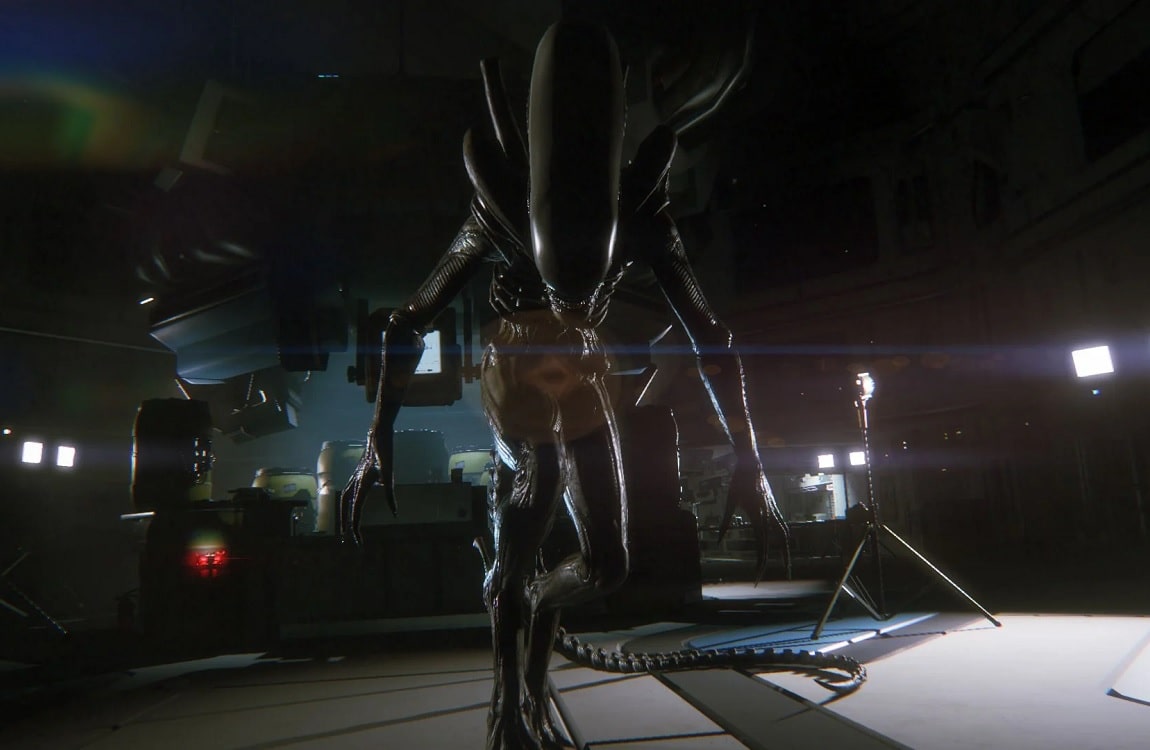
The Xenomorph Drone vs. Xenomorph Warrior debate is an old one amongst the Alien fandom but the more recent consensus seems to lean towards the two Alien castes being one and the same. However, some Alien media like the recent Aliens: Fireteam Elite game have clearly marked them as separate classes, so they are both listed here for completeness' sake. The Xenomorph drones tend to work alone, have smooth heads, and usually kill their prey instead of capturing them. The drone from Aliens: Fireteam Elite attacked with hit-and-run tactics, escaping back to the vents after wounding the Colonial Marines. Remarkable drones include Kane's son from the first Alien movie and Stompy, the Xenomorph onboard the Sevastopol station in Alien: Isolation.
Queen
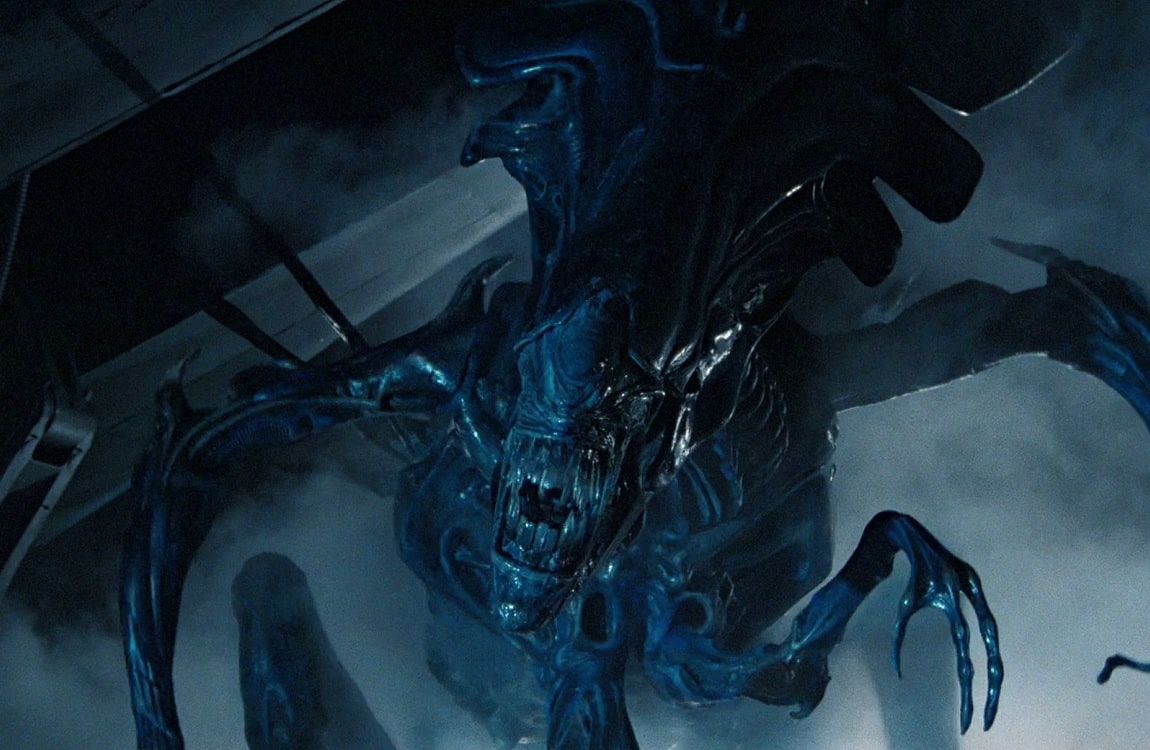
The queen is one of the biggest Xenomorph types and the leader of the hive. She has higher intelligence than other members of the hive, although her main purpose is to produce eggs. She does that through her ovipositor. When in need, she will detach from the egg sack and fight for the survival of the hive. Being a female Xenomorph, she has a strong maternal instinct and will do anything to protect her eggs and chestbursters.
Runner

The runner is a special type of Xenomorph warrior that is born from a quadruple animal, like a dog or an ox. Through the DNA reflex, it inherits some traits from the host, like its speed and aggressiveness. It does not have the dorsal tubes on the back like regular warriors and its body is slimmer. The runners are also more proficient at walking on walls on ceilings.
Newborn

The Newborn was a genetic mutation and an offspring of Ripley 8 and the cloned queen born on the USM Auriga. It killed the queen and considered Ripley 8 to be its mother. It had a very large size from birth and human-like features like light skin and eyes. It almost reached Earth but was eventually killed by Ripley 8. It is undoubtedly one of the ugliest Xenomorph types.
Predalien
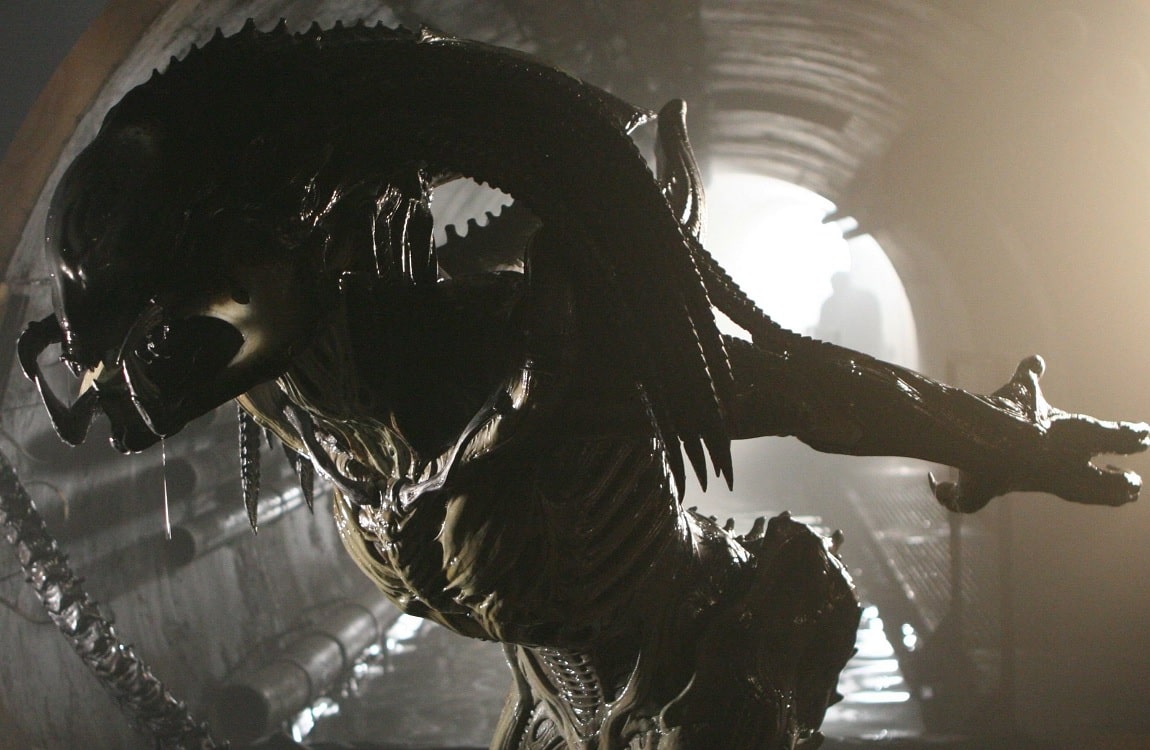
The Predalien is a special type of Xenomorph who is born from a Predator. It is bigger than a regular Xenomorph warrior and is usually more aggressive. It will inherit mandibles and even the dreadlocks from a Predator. Its skin is usually lighter than a regular Xenomorph. The Predalien seen in Aliens vs. Predator: Requiem was also able to impregnate hosts with embryos through its mouth.
Deacon
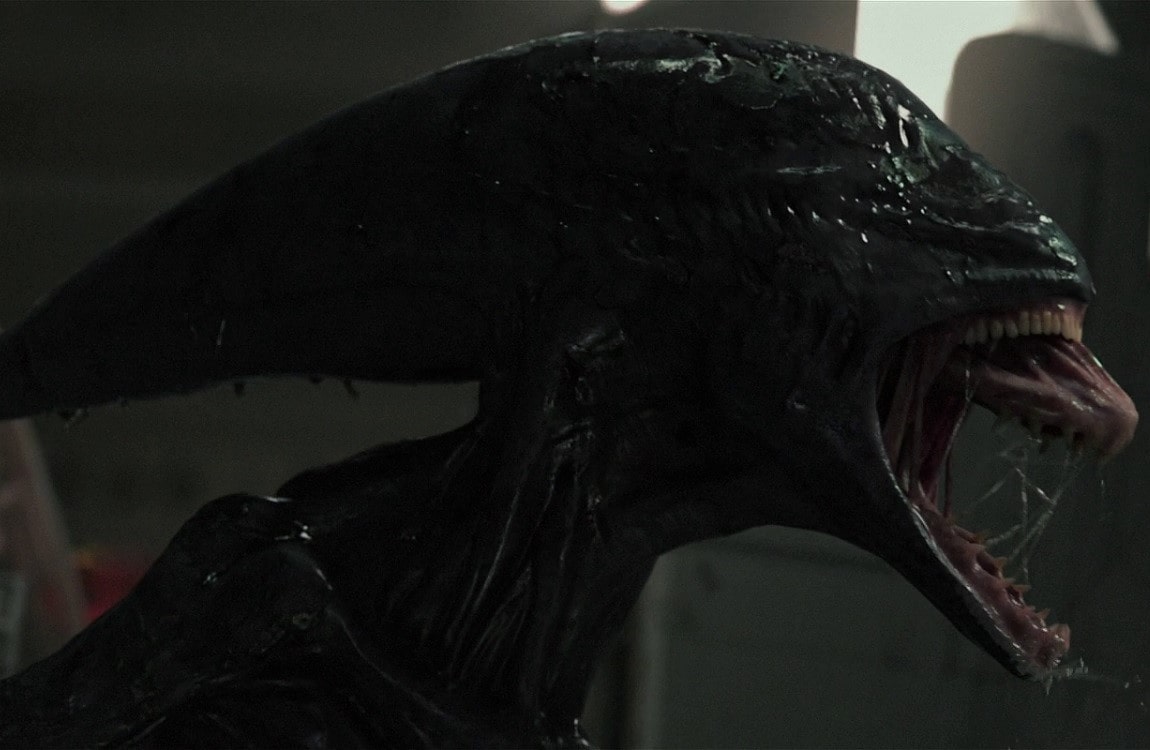
The Deacon was not a Xenomorph per se, but more like a close relative of the Xenomorph. It was born from an Engineer who was facehugged with a special type of facehugger on the planet LV-223. It had an inner mouth, an elongated head but no tail. It is unknown if it had acid for blood.
Neomorph
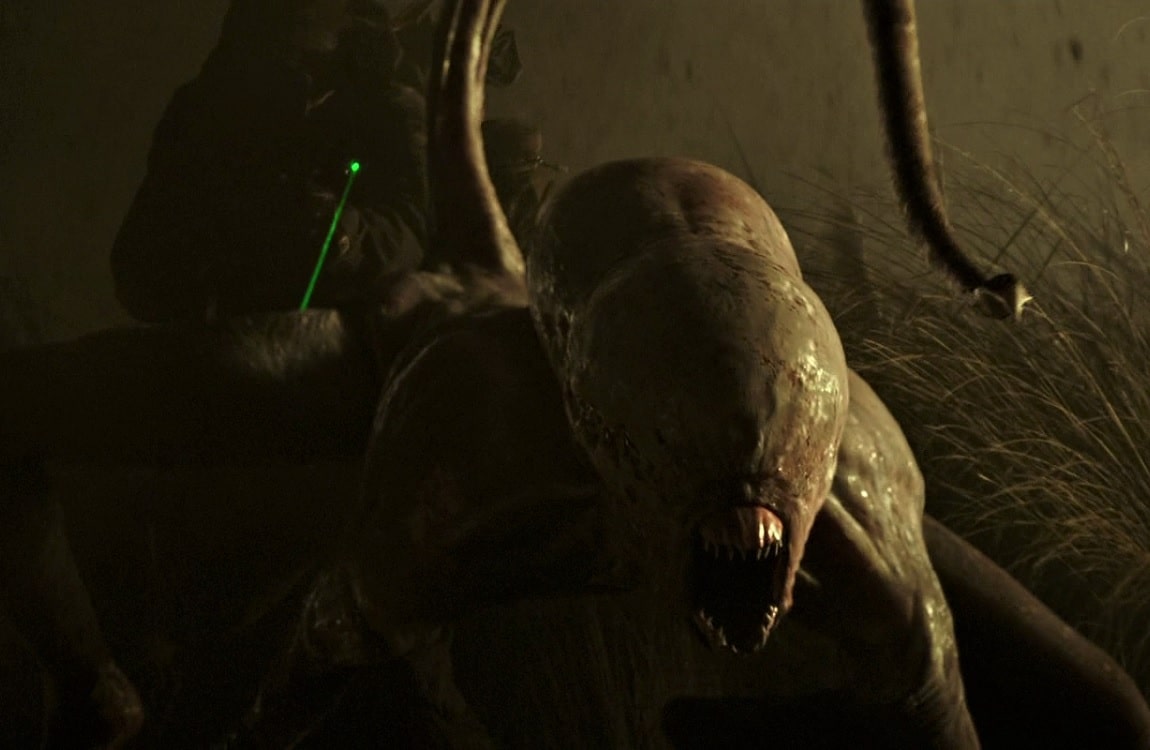
The Neomorph was not a Xenomorph, but a close relative to the creature and similar to the Deacon in the way that it was a byproduct of the events of Prometheus. Due to David releasing the black goo on Planet 4, small plants emitted a substance that entered the nose and ears of two Covenant crew members, infecting them with Neomorphs. The resulting creature erupted from either the back or the mouth of the person and grew rapidly. In its adult form, the Neomorph was white, very agile and aggressive. Compared to the Xenomorph, it lacked an inner mouth and dorsal spines. It probably did have acid for blood, but perhaps less effective than the Xenomorph's.
Protomorph
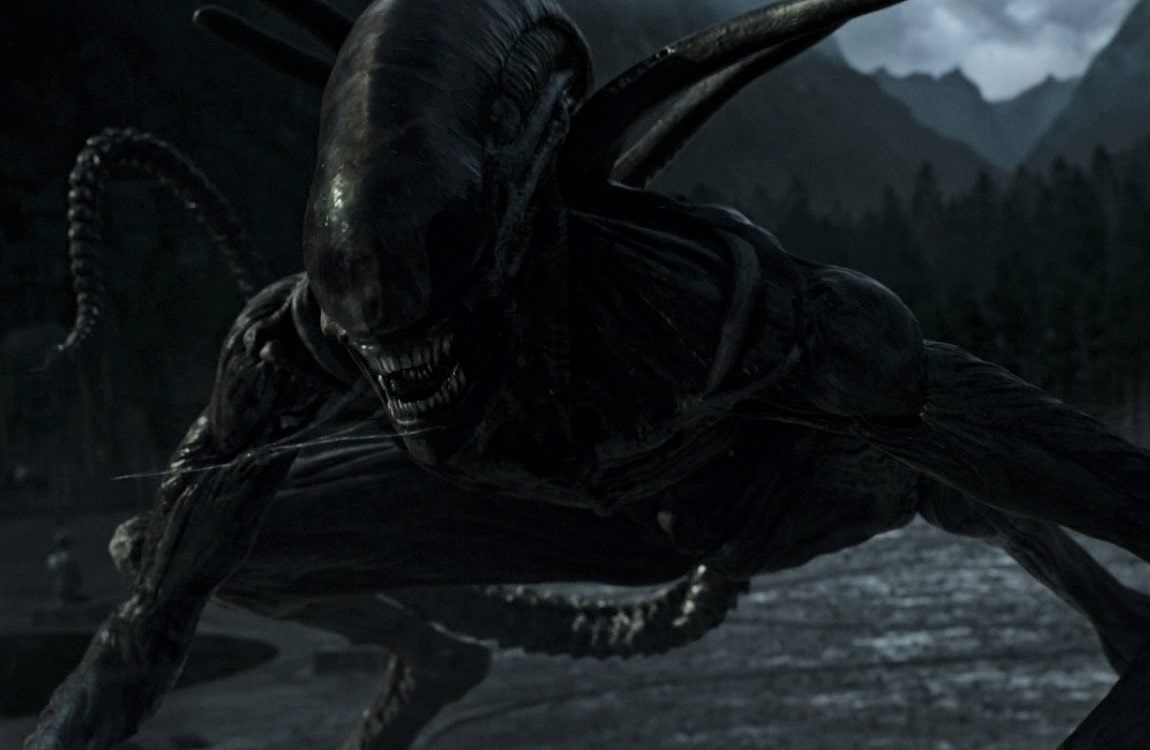
The Protomorph (also known as Praetomorph) was a direct creation of David on Planet 4, but probably based on the Engineer's original designs seen on the wall mural in Prometheus. The Protomorph eggs were a bit different, with a more elongated and two-petal design. The facehuggers needed only a few seconds to infect a person and the resulting chestburster was quite different as well, having a darker skin tone and fully developed limbs. In its adult form, the Protomorph looked and behaved similarly as a regular type of Xenomorph would, being perhaps a bit more agile and aggressive.
Romulus Xenomorph
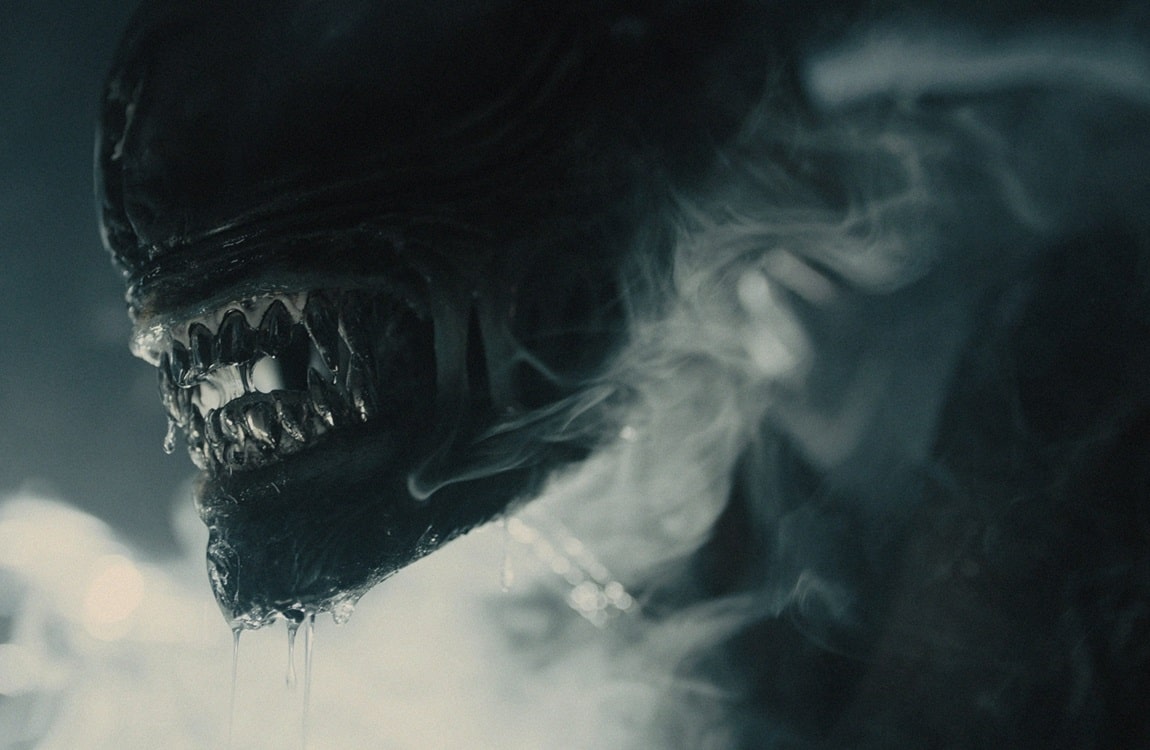
The Romulus Xenomorphs were born on board the Renaissance Space Station by Weyland-Yutani, as a result of experimentations in the secret Romulus lab. They were descendants of the original "Big Chap" Xenomorph, who was found floating near the Nostromo wreckage and brought to the station. The company 3D printed Facehuggers based on the Xenomorph's DNA, resulting in a full infestation of the station. Not surprisingly, the Romulus Xenomorphs are very similar to the original Nostromo Xenomorph, designed by H.R. Giger. Its biggest difference is the intermediate "cocoon" state between the chestburster and adult, never before seen in Alien lore.
Offspring
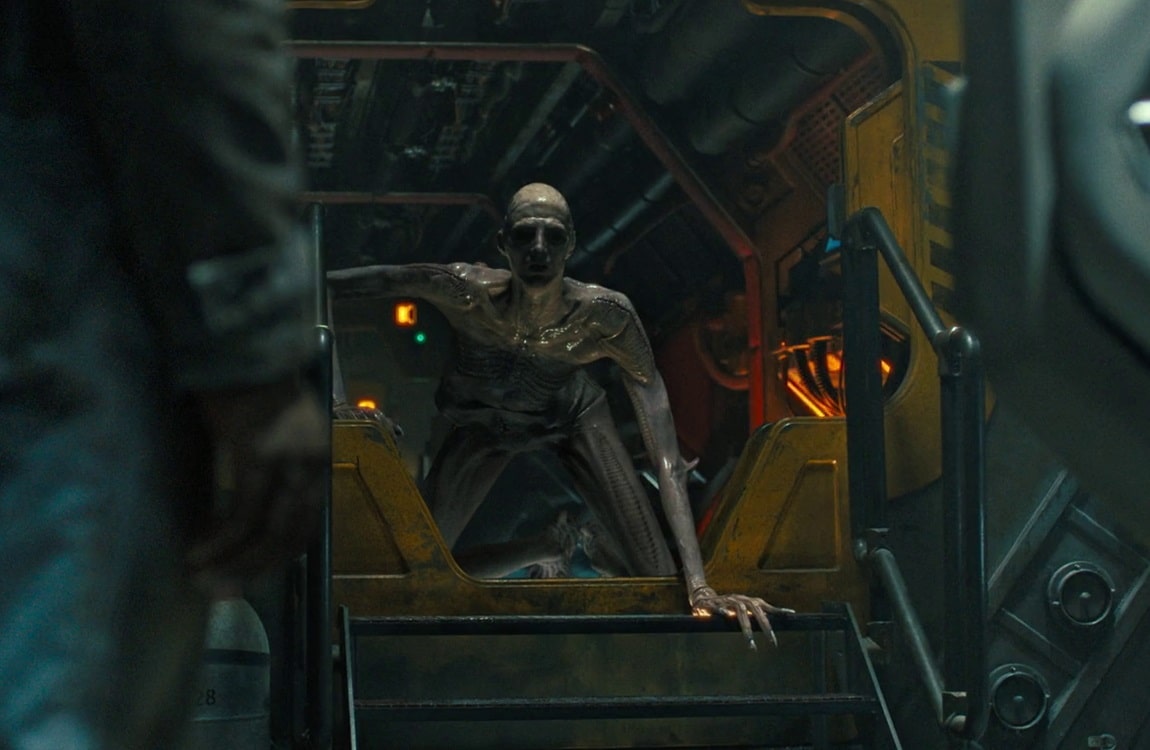
The Offspring was not directly a Xenomorph type, but a human/Engineer/Alien hybrid introduced in Alien: Romulus. Being most similar to the Newborn from Alien: Resurrection, the Offspring was born from a pregnant human female infected with the Black Goo Pathogen. Its first stage was inside an egg, resembling a human baby, but it grew rapidly into an Engineer-like pale humanoid. In its final stage, the Offspring started to grow a tail, inner mouth, and dorsal tubes. The Offspring was killed by Rain Carradine on board the Corbelan IV, by dumping its cargo compartment into space.
Expanded Universe Xenomorph Types: Praetorian
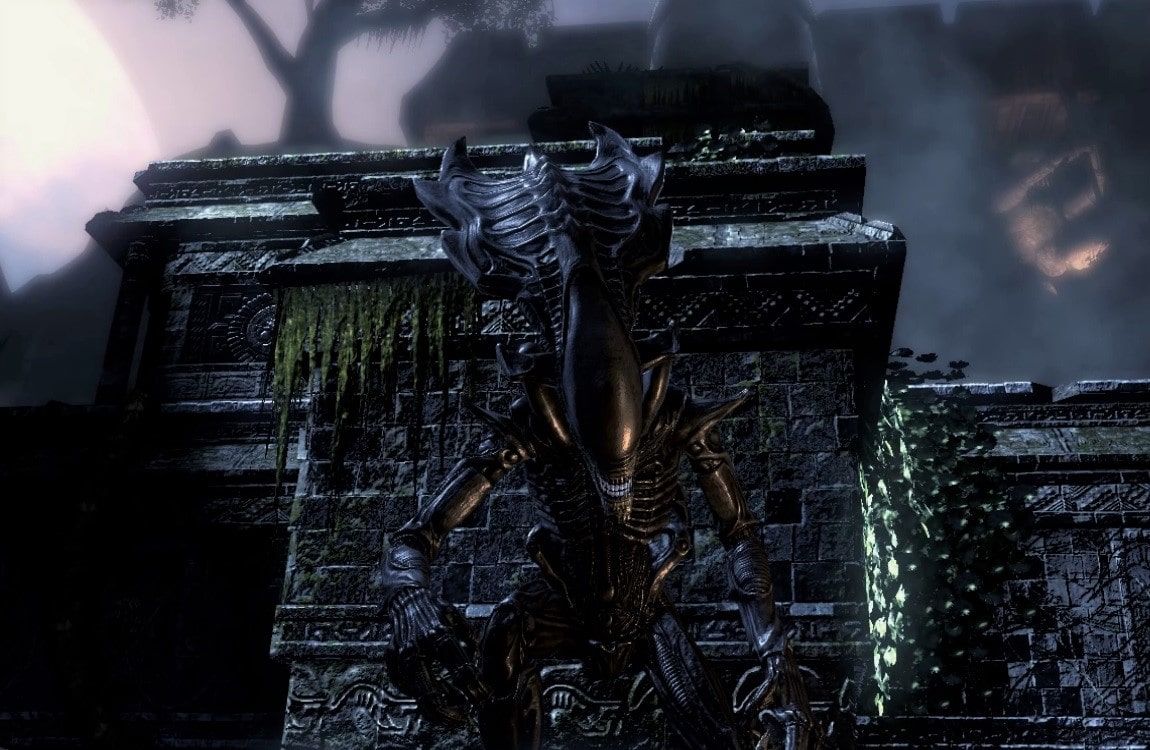
The Praetorian is a royal guard for the queen and her eggs. Although not featured in the movies, it has been present in many Alien vs Predator games as a boss type of enemy. It is much larger and tougher than a regular warrior but slightly smaller than a queen. It would be great to see the Praetorian in a future Alien movie.
Expanded Universe Xenomorph Types: King Alien
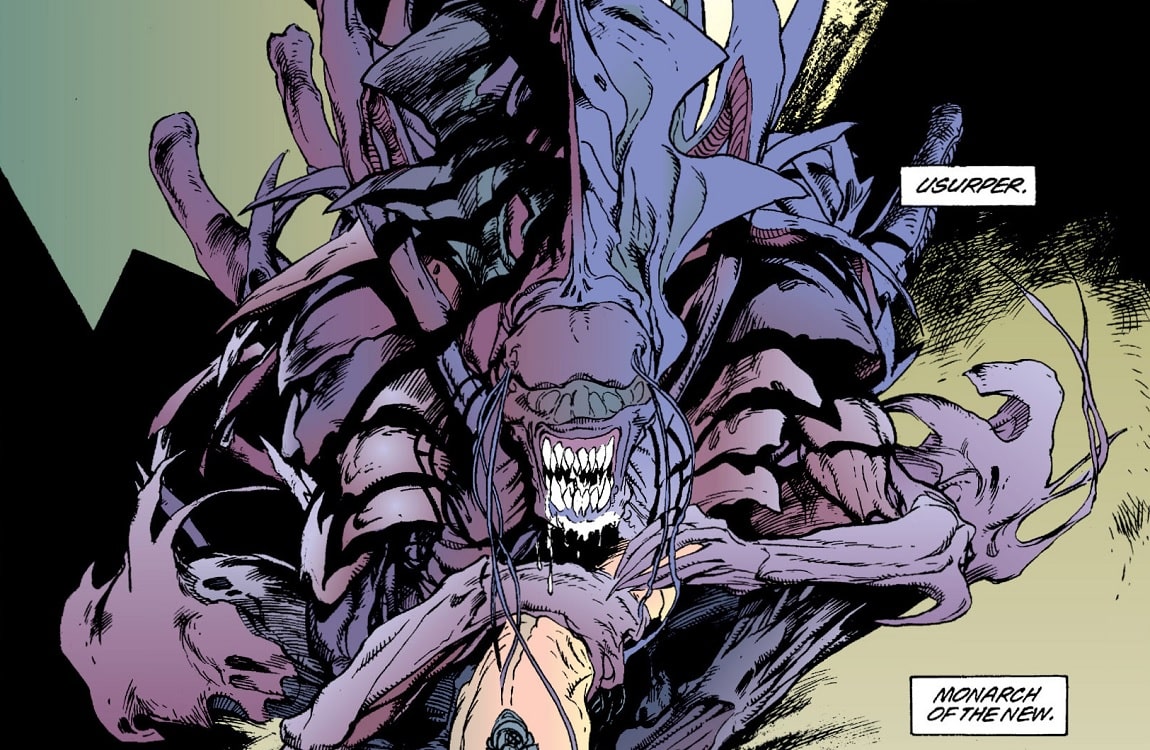
The king Alien also known as the Rogue was a genetic experiment created by Professor Ernst Kleist at Charon Base. It was a creature bigger than all the other Alien types, including the queen. It fought the queen Alien and lost the fight because the queen was able to outsmart it. The Rogue was featured in the Aliens: Rogue comic book and novel, later released as part of the Aliens Omnibus: Volume 3.
Expanded Universe Xenomorph Types: Queen Mother
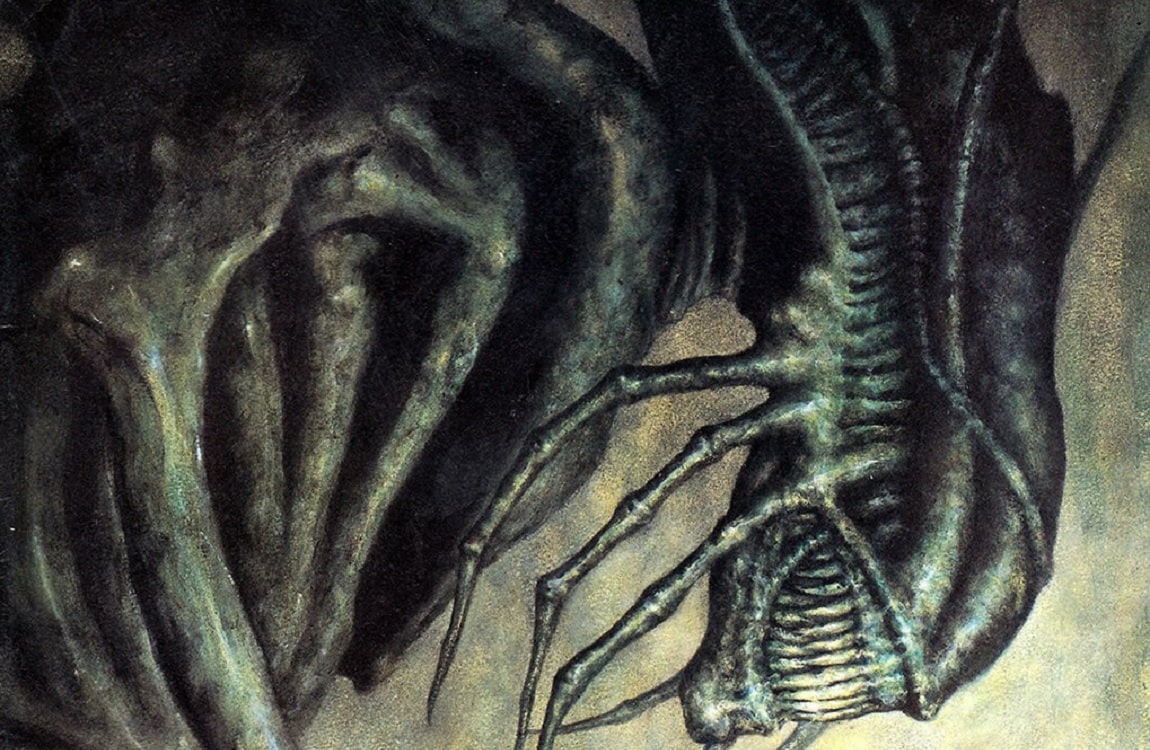
The Queen Mother is another large and rare Xenomorph type that only appeared in Aliens: Female War. She resided on Xenomorph Prime and controlled all the other Queens, not only on the same planet but elsewhere in the galaxy. The Queen Mother had a telepathic link to other Xenomorphs and could even impact the dreams of humans. In Female War, the Queen was captured from the Xenomorph Homeworld, taken to Earth, and nuked at the moment when most of the Xenomorphs flocked to meet her.
Expanded Universe Xenomorph Types: Matriarch
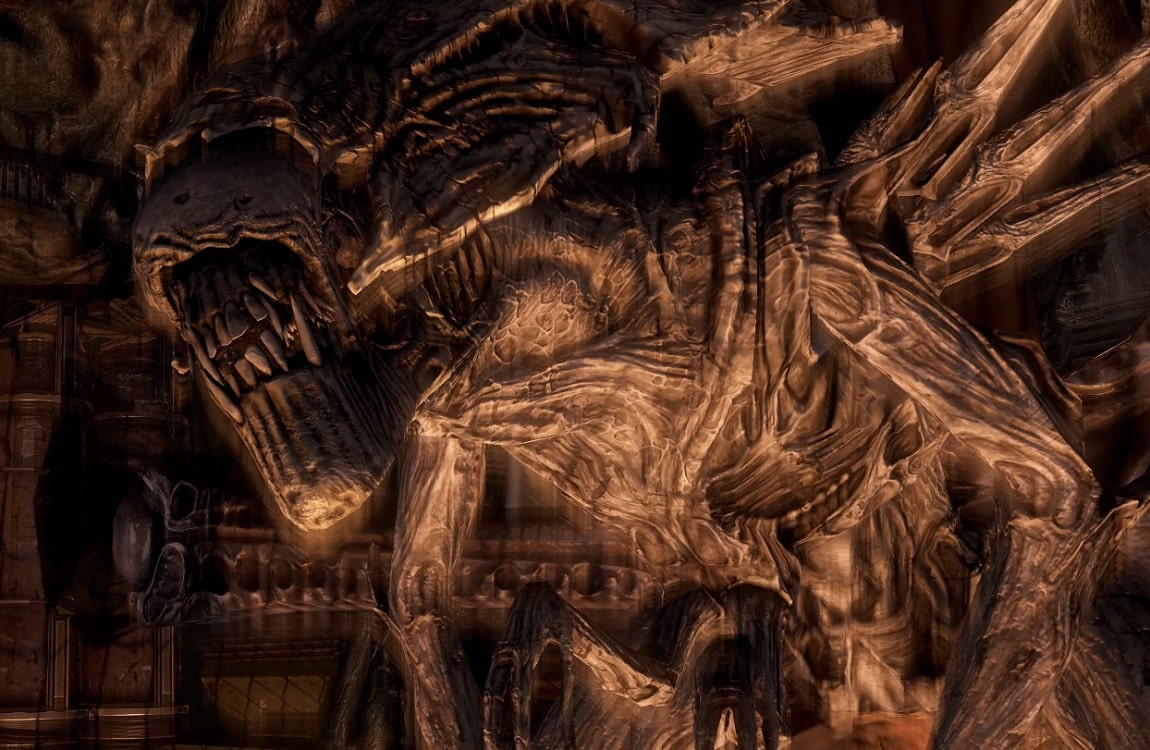
While some other Xenomorphs have turned white due to DNA manipulation or albino pigmentation, the Matriarch Queen on BG-386 turned to whitish-grey color due to old age. She was over a thousand years old when she died at the hands of a lone Colonial Marine during the events of Aliens vs. Predator 2010. Her skin had formed cracks and ridges due to old age as well. Notably, the hundreds of years old Antarctica Queen from the first Alien vs. Predator movie seemed to be a lighter tone as the young one in Aliens as well.
Expanded Universe Xenomorph Types: Spitter Alien
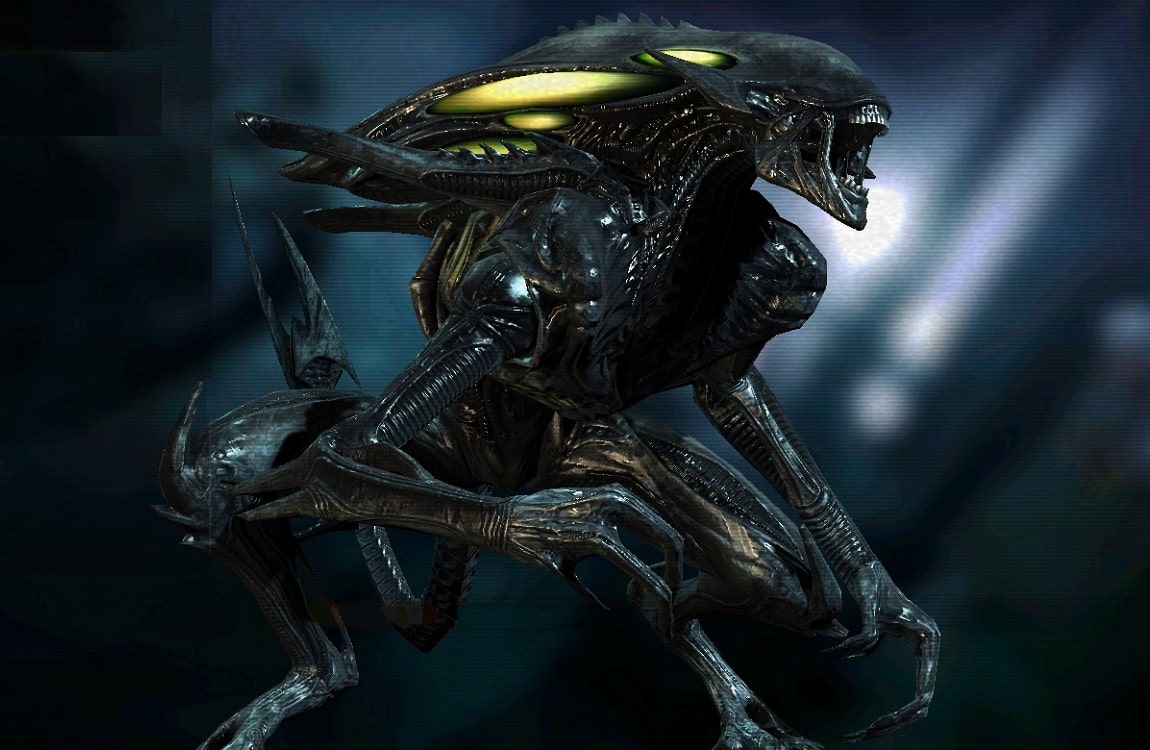
Although the Xenomorphs are known to spit acid from time to time, a specialized Spitter type was introduced only in the video games. The Spitter Alien first showed up in Aliens: Colonial Marines where its sides of the head had acid bulges and it could spit acid at long distances. This class was also playable in multiplayer and its appearance was customizable. The Spitter Alien will again show up in Aliens: Fireteam, where it resembles more of a Deacon or a Neomorph, with a shorter sharp-tipped head and lighter skin.
Expanded Universe Xenomorph Types: Crusher Alien
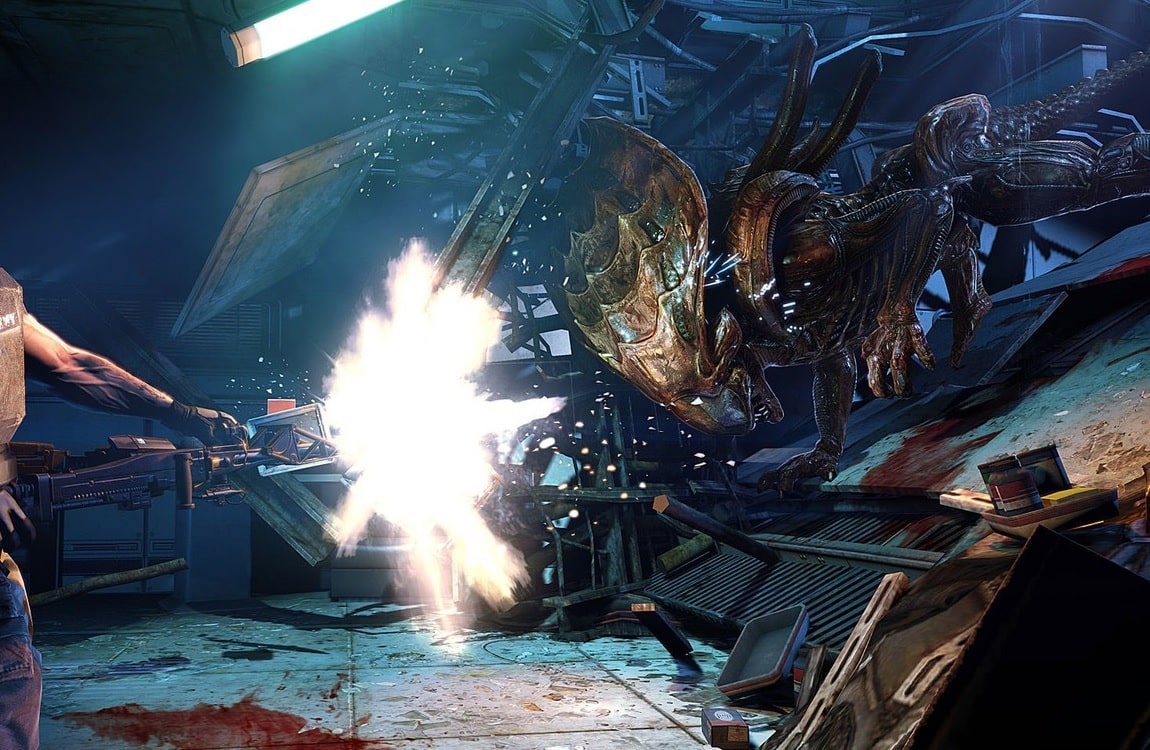
Besides the Queen, the Crusher is one of the most heavily armored Xenomorph, especially in the head. It is a bit smaller than the Praetorian and most likely less intelligent as well. However, it makes up for this with its powerful charging attack which is performed by running on all four legs. The Crusher shows up both in Aliens: Colonial Marines and Aliens: Fireteam Elite and is best attacked from behind, where its skin is thinner. It is unknown if the Crusher was born from a large animal (perhaps a bull) or was morphed as a special subtype of the Praetorian.
Expanded Universe Xenomorph Types: Burster Alien
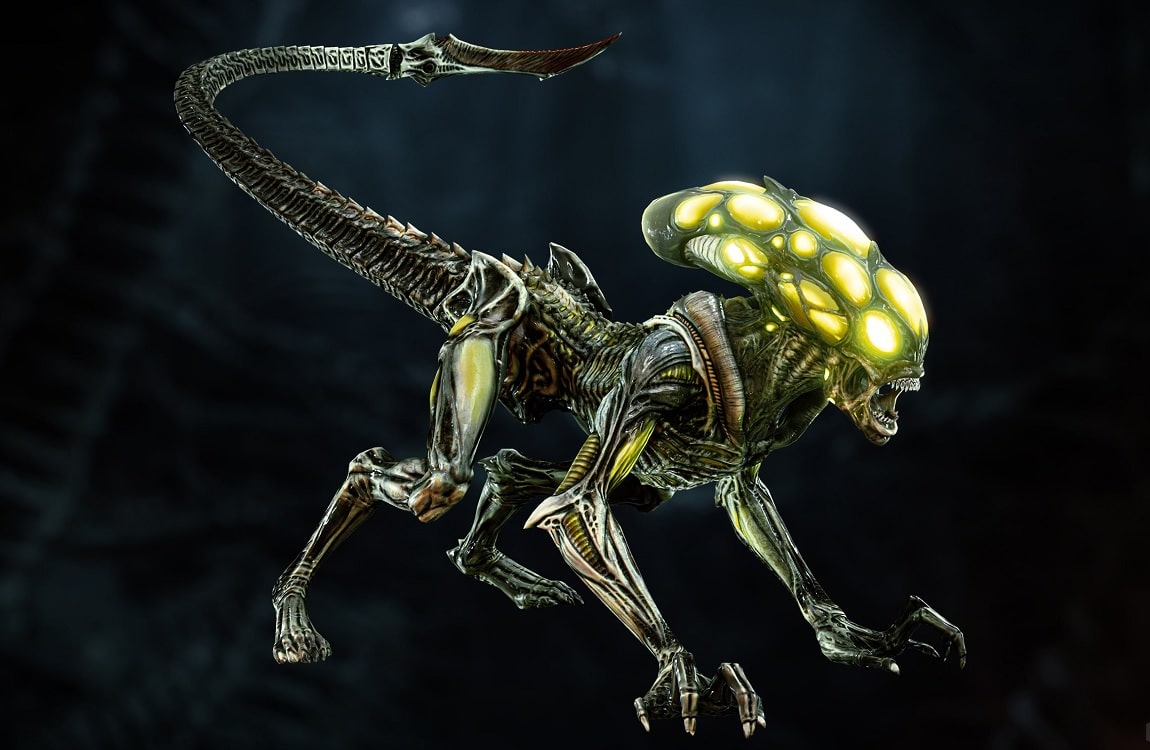
The Burster Xenomorph was also introduced in Aliens: Fireteam Elite, although its characteristics are very similar to the Boiler from Aliens: Colonial Marines. The Burster acts like a Runner, being very agile and aggressive, usually attacking in bigger groups. It attacks with its claws, and the cysts in its head explode in a cloud of acid when killed. This is the main difference with the Boiler, which is slow and explodes immediately when close to a human. The Boilers are seemingly blind as well, although Xenomorph vision is always up for debate.
Expanded Universe Xenomorph Variant: Prowler Alien
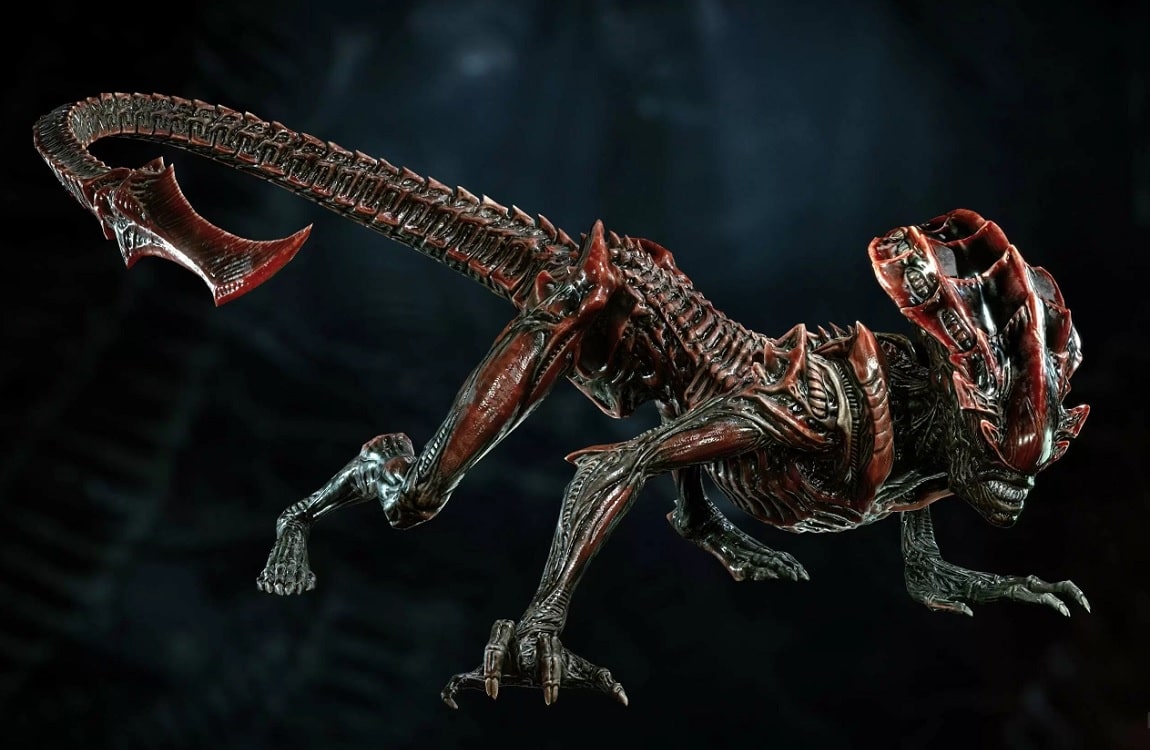
The Prowler Xenomorph from Aliens: Fireteam Elite is similar to the Runner but is more heavily armored and able to capacitate its enemies by leaping on them. The player can then either hope for help from their teammates or get free by completing a number of prompts, losing health in the process. The Prowler has reddish-black skin, a long spiked tail, and a head slightly larger than the Runner. This Xenomorph variant has been heavily influenced by the Hunter zombie from the Left 4 Dead games, although it's impossible to free oneself from this zombie without the help of others.
Crossover Xenomorph Variant: Tarkatan Xenomorph
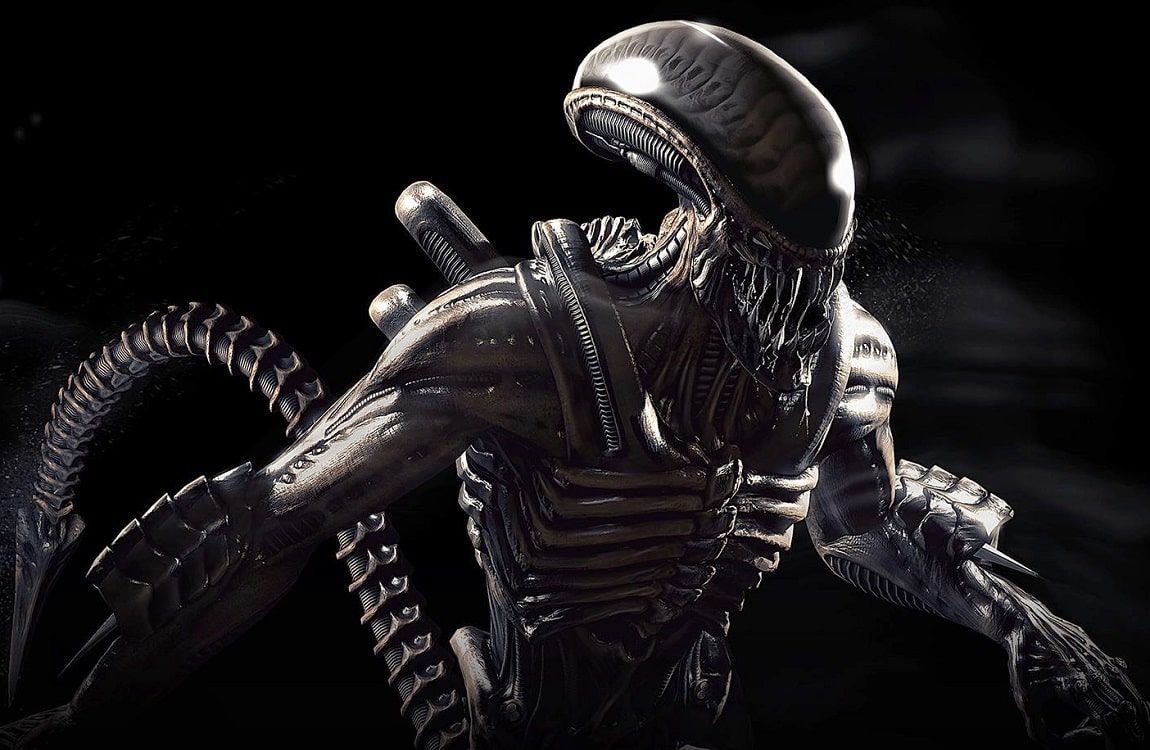
Out of the three Xenomorph variants included in Mortal Kombat XL, the Tarkatan Xenomorph was the deadliest one. While the Acidic and Konjurer Xenomorphs focused on ranged attacks, the Tarkatan liked to get close and personal, dealing deadly blows with its bladed claws. This Xeno type was unsurprisingly born from the Tarkatan species, who inhabited the Outworlds in the Mortal Kombat lore. A lone egg lay dormant for a long time until it was found by the leader of a Tarkatan patrol. The newborn creature inherited the characteristics of both Xenomorph and Tarkatan and roamed the Outworld ever since.
Expanded Universe Xenomorph Types: Red Xenomorph
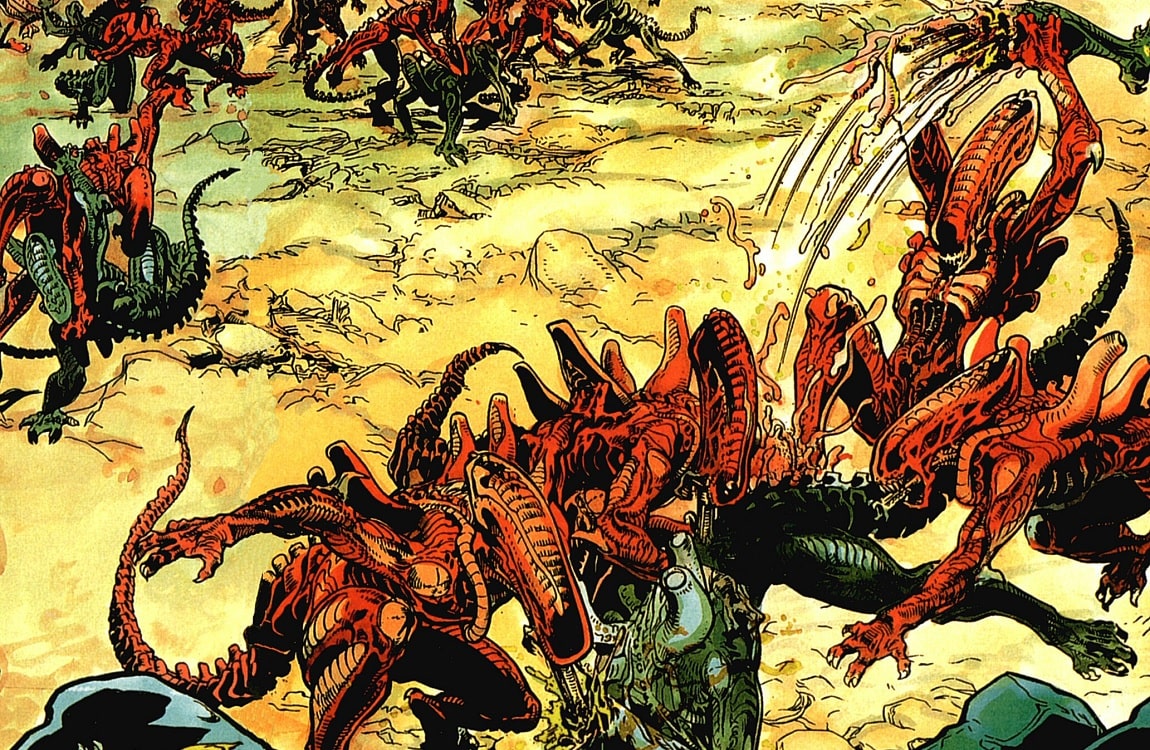
The red Xenomorphs were a subspecies of Aliens that evolved on Xenomorph Prime after the Queen Mother was taken away from the planet. In Aliens: Genocide, the lesser Queens started to fight for supremacy which led to an all-out war between the red Xenomorph breed (commanded by the Red Queen) and the regular black Xenomorphs. The war was at a stalemate until another group of humans led by Daniel Grant landed on the planet intending to extract huge amounts of Royal Jelly, a valuable mind-altering substance. The human soldiers nuked the red Xenomorph hive, giving the regular Xenomorphs an advantage and wiping out the rest of the red Xenomorphs, while the humans successfully extracted and left with the Jelly.
Expanded Universe Xenomorph Types: White Hybrid Xenomorph
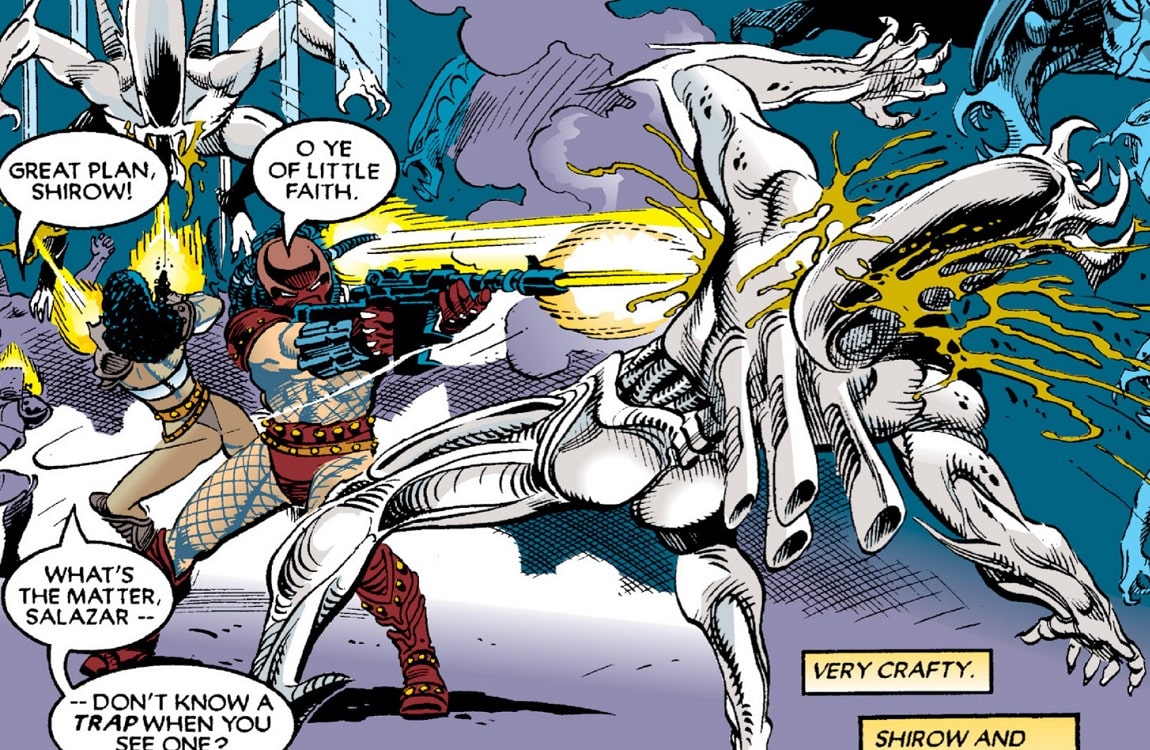
The White Hybrids were one of the more outlandish Xenomorph types from the comic books, appearing in the epic and weird Aliens vs. Predator: Deadliest of the Species series. Creation of a rogue AI named Toy, they were a mixture of Xenomorph, human, and Predator DNA, leading to white skin, a Predalien like-appearance, and higher intelligence. The White Hybrids were led by the Hybrid King, a big creature that could speak the human tongue. The hybrids were wiped out by a misfit group of human soldiers led by Ash Parnall and the famed Big Mama Predator.
Expanded Universe Xenomorph Types: Trophy Hatchling
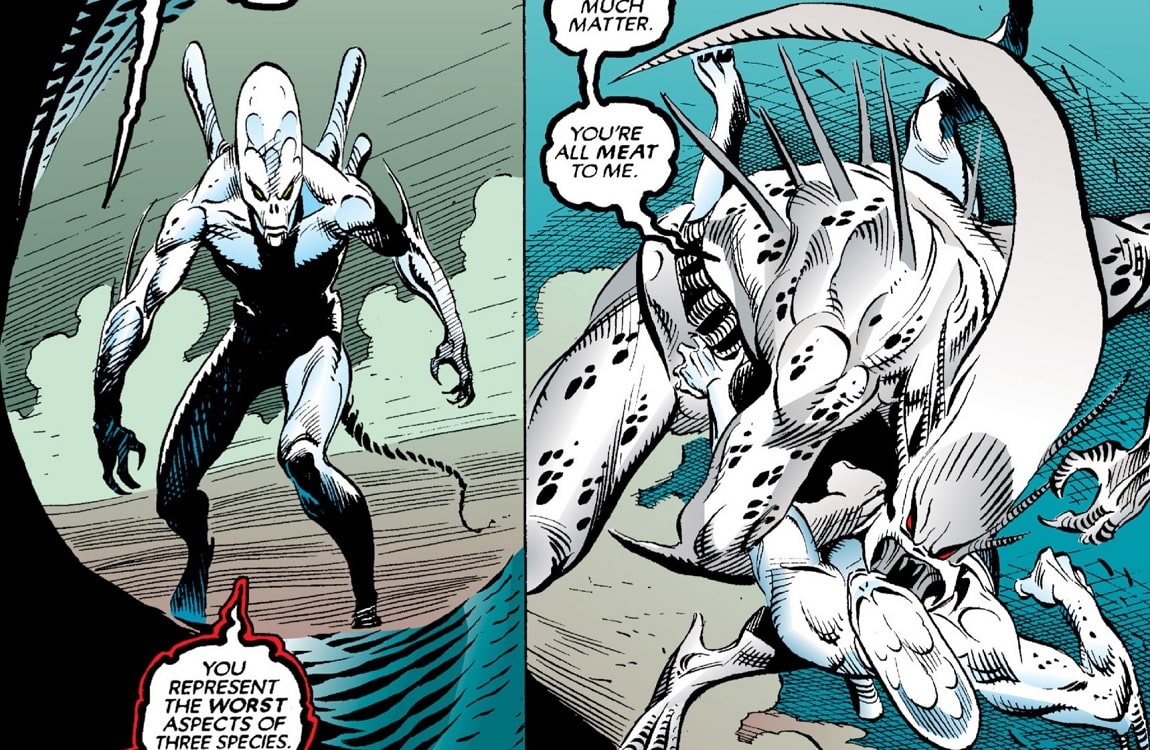
After Ash Parnall was infected by a special facehugger, she birthed another white Xenomorph - named the Trophy Hatchling (as Ash herself was a trophy wife). The Trophy Hatchling allied itself with Big Mama and fought the Hybrid King to a stalemate. The race of white hybrids was wiped out when the skyliner belonging to the Montcalm-Delacroix et Cie exploded in orbit. Only the Trophy Hatchling survived and joined the crew of Big Mama, wishing to be something better than the evil race of Xenomorphs.
Expanded Universe Xenomorph Types: Tusked Xenomorph
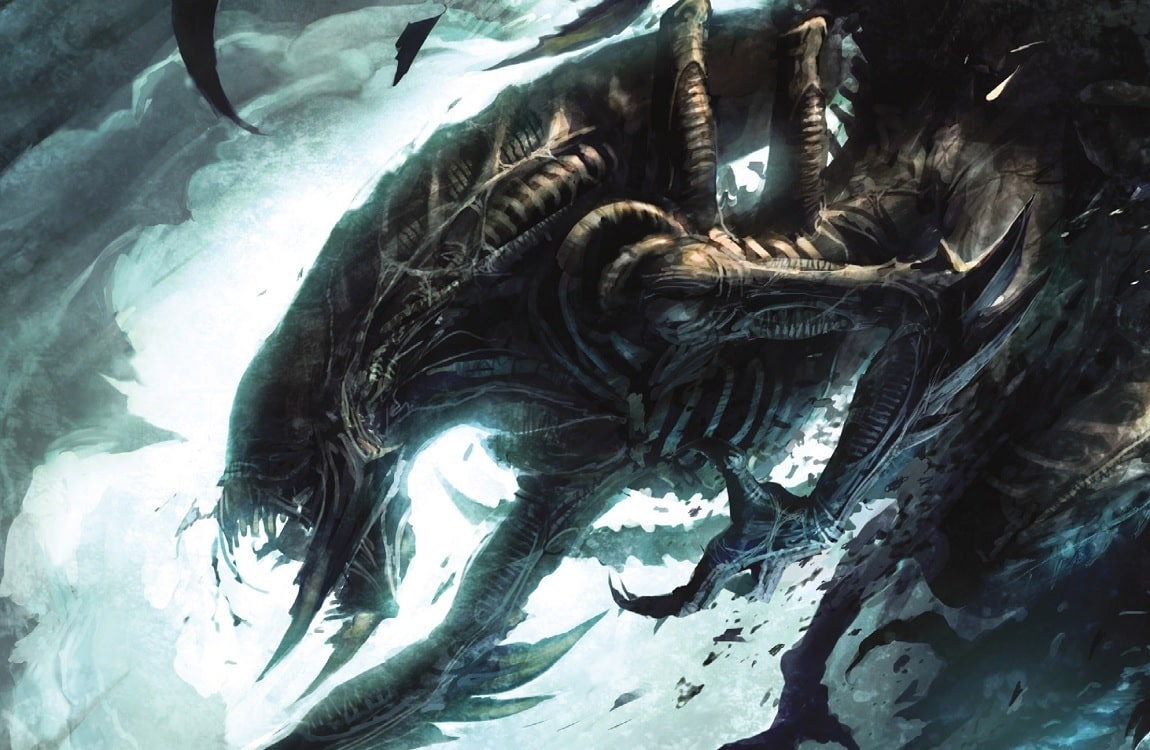
The Predaliens are not the only Xenomorphs to have tusks, they are also present in this special breed of Alien. Just like the Predaliens, they have extra tusks on their jaws, but they are missing dreadlocks and are not born from Predators. The Killer Predator clan used the tusked Xenomorphs as attack dogs and they were forced to obey their Yautja masters. When these Bad Blood Predators were defeated by Machiko Noguchi and the traditional Yautja clan, the Xenomorphs were freed and sought out a Queen to command them. A Queen was found on the planet Ryushi, who accepted this breed of Xenomorphs as her own.
Hybrid Xenomorph Types: K-Series Xenomorph
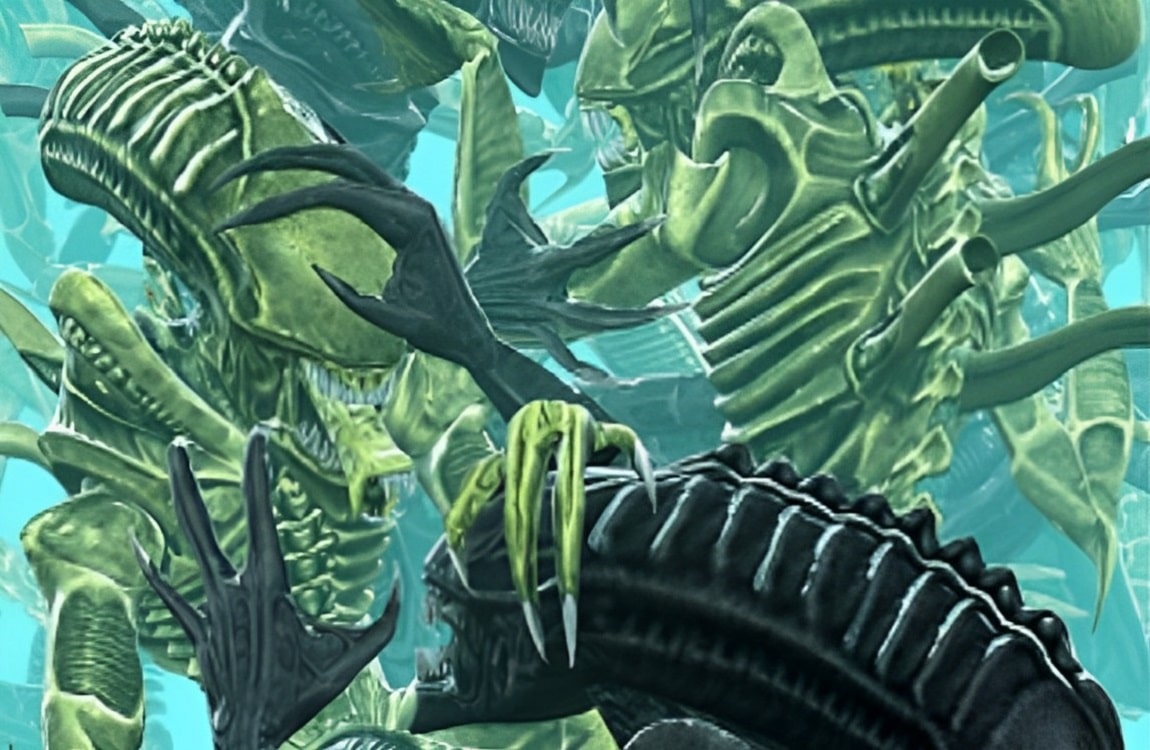
The K-Series Xenomorphs were bred secretly by Dr. Kadinsky in a hidden Weyland-Yutani laboratory on LV-742, as depicted in the lesser-known video game Aliens vs. Predator: Extinction. These unique Xenomorphs possessed gold and silver skin, forming an entire race that included a Queen and Praetorians. They engaged in a fierce battle against the original Xenomorph strain but ultimately met defeat, similar to the conflict between Red and Black Xenomorphs in Aliens: Genocide. Although a few K-Series hybrids managed to escape the lab, they were relentlessly hunted down and exterminated, proving to be an inferior type to the pure Xenomorphs.
Deadliest Xenomorph Types: Necromorph
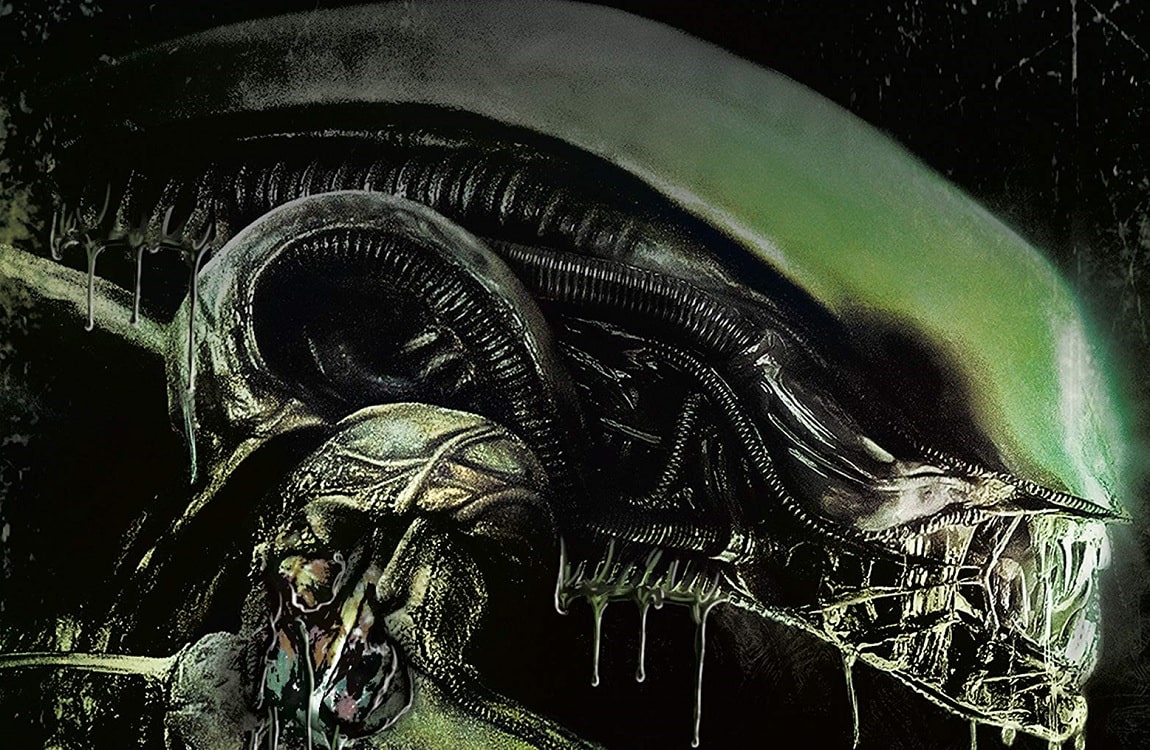
The Xenomorphs are highly adaptable to their host, being able to take over certain traits from the organism they are born from. In Alien: Prototype, a Xenomorph bred in a lab by Dr. Gagnon took over a highly infectious necrovirus and adapted it to its body. It was then able to rapidly infect other humans, emitting the virus from blisters all over its body. The so-called Necromorph did not even have to touch anyone, a black cloud of disease spread around him, even entering the air vents. All this made the Alien especially hard to kill, but veteran Colonial Marine Zula Hendriks was able to take it down with the help of young recruits.
Rare Xenomorph Types: Space Jockey Xenomorph
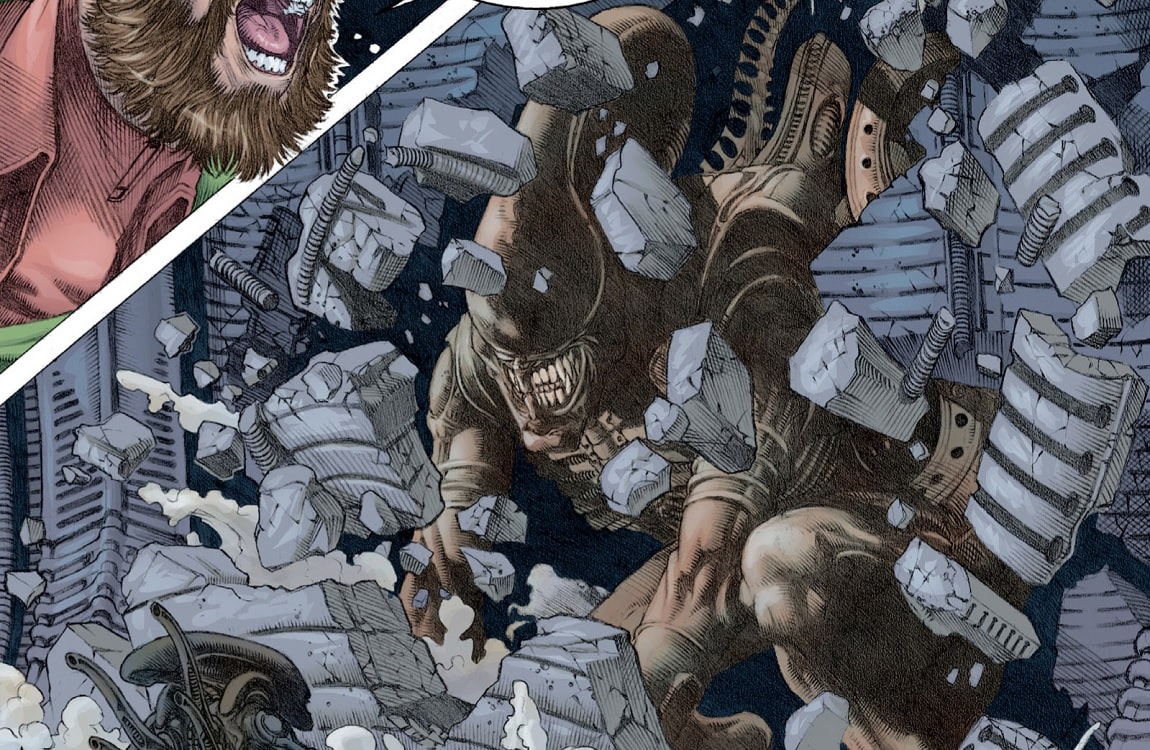
The Space Jockey Xenomorph shows up only a couple of times inside the Expanded Universe, although it is heavily hinted at already in the first Alien movie when the crew of the Nostromo found the giant Space Jockey with a hole in his chest. Tied to the origins of the Xenomorph, the creature was born from an Engineer just like a Deacon but is the result of a regular facehugger without any confusing black goo modifications that happened during the events of Prometheus. The Space Jockey Xenomorph is huge and is depicted as being even bigger than a Praetorian. It showed up in Aliens: Apocalypse where it ripped apart regular Xenomorphs in a crazed frenzy. The Space Jockey Alien was also a miniboss in the Aliens: Infestation DS game, where it has an elephant-like trunk hanging from its face, which would later be invalidated by Prometheus that shows Engineers being humanoid creatures and the trunk is just part of the suit.
Rare Xenomorph Types: Black Goo Infected Xenomorph
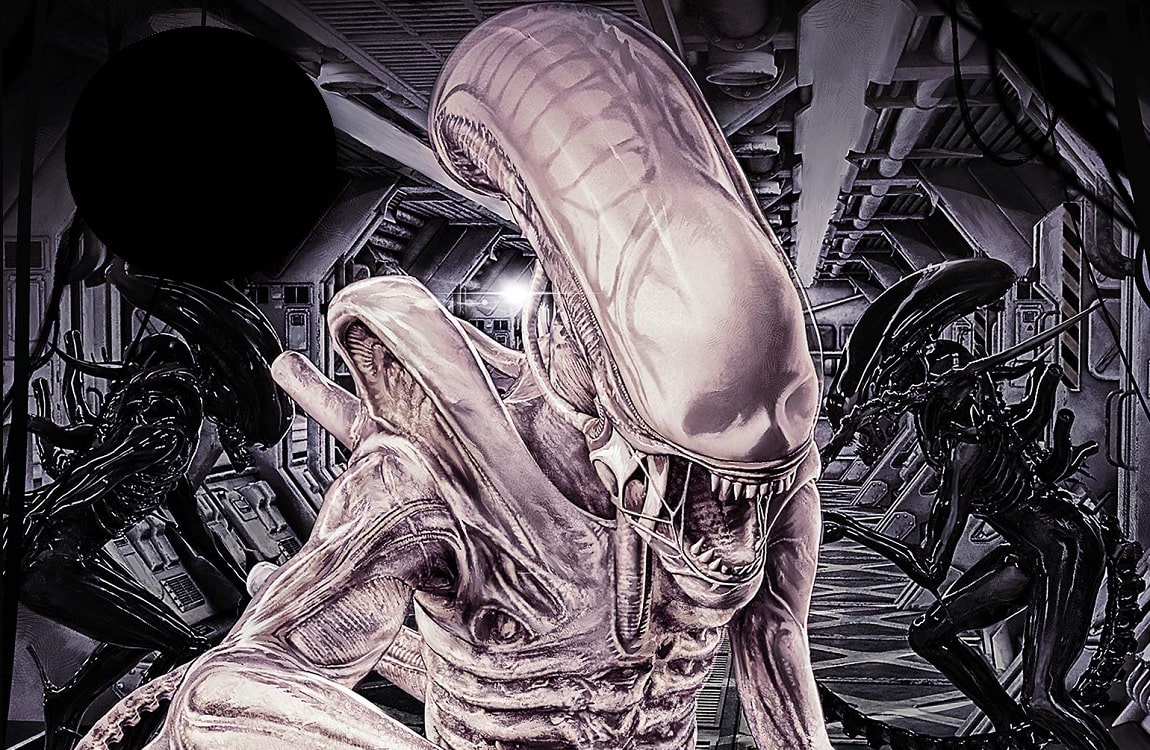
The Aliens: Infiltrator book described what might happen if a Xenomorph became infected with the Black Goo Pathogen. In this story that served as a prequel to Aliens: Fireteam Elite, Xenomorphs were infected by Weyland-Yutani scientists at an early stage in their lifecycle. Specimen number 7 was perhaps the most interesting result - a Xenomorph with white skin and a higher level of intelligence. It was able to command other Xenomorphs telepathically and helped them escape from the research lab on Pala Station, but died later in an assault conducted by surviving scientists and Colonial Marines. The Fire and Stone comic book saga also included a Black Goo-infested Xenomorph, but fused together with a human.
Rare Xenomorph Variants: Alpha
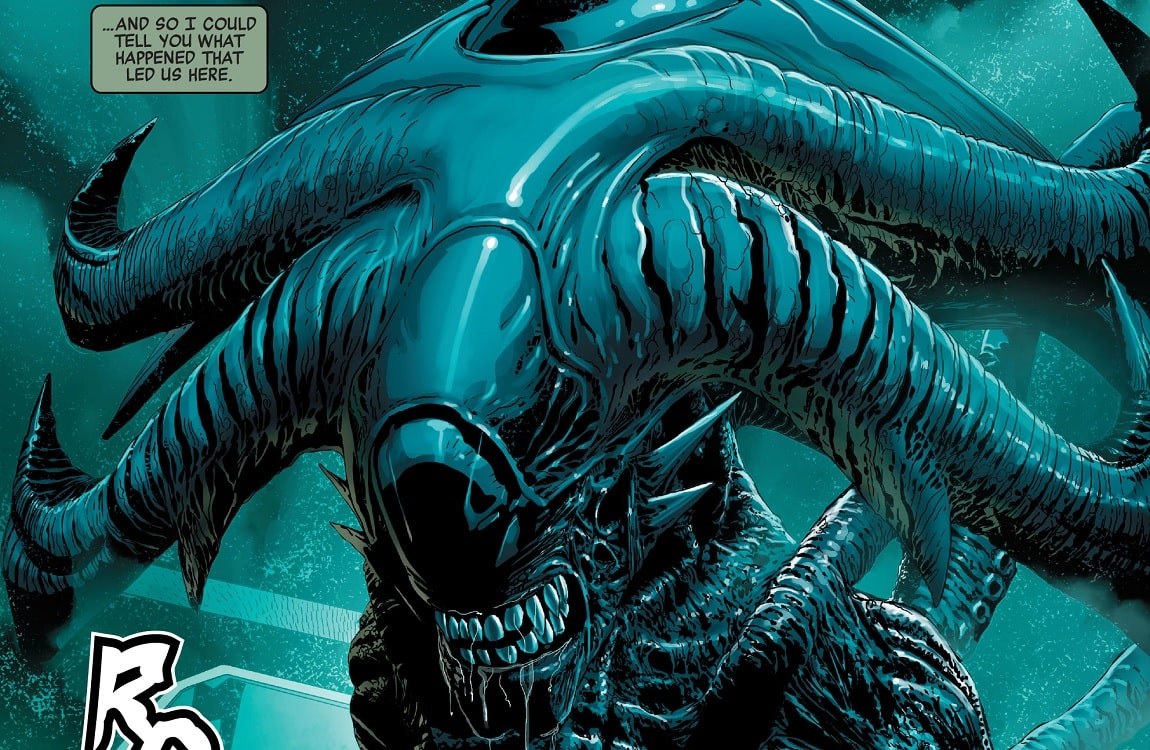
The new Marvel Alien series titled Bloodlines introduced a unique-looking Alien type - the Alpha. This horned Xenomorph was similar to a Praetorian in size and took some traits from the Bull Alien, introduced in the Aliens: Space Marines comic. The Alpha was born on Epsilon Station from Gabriel Cruz, a rare case of chestburster removal where the host survives. The big Xenomorph followed Cruz around and the two fought to the death in zero gravity outside the station. Alpha Warriors have existed in the series before, they are slightly bigger and more intelligent, often being able to command other Warriors in battle while the Queen is not near. The Sevastopol Alien, Grid Alien, and Specimen 6 are such examples of Alphas.
Rare Xenomorph Variants: Goddess
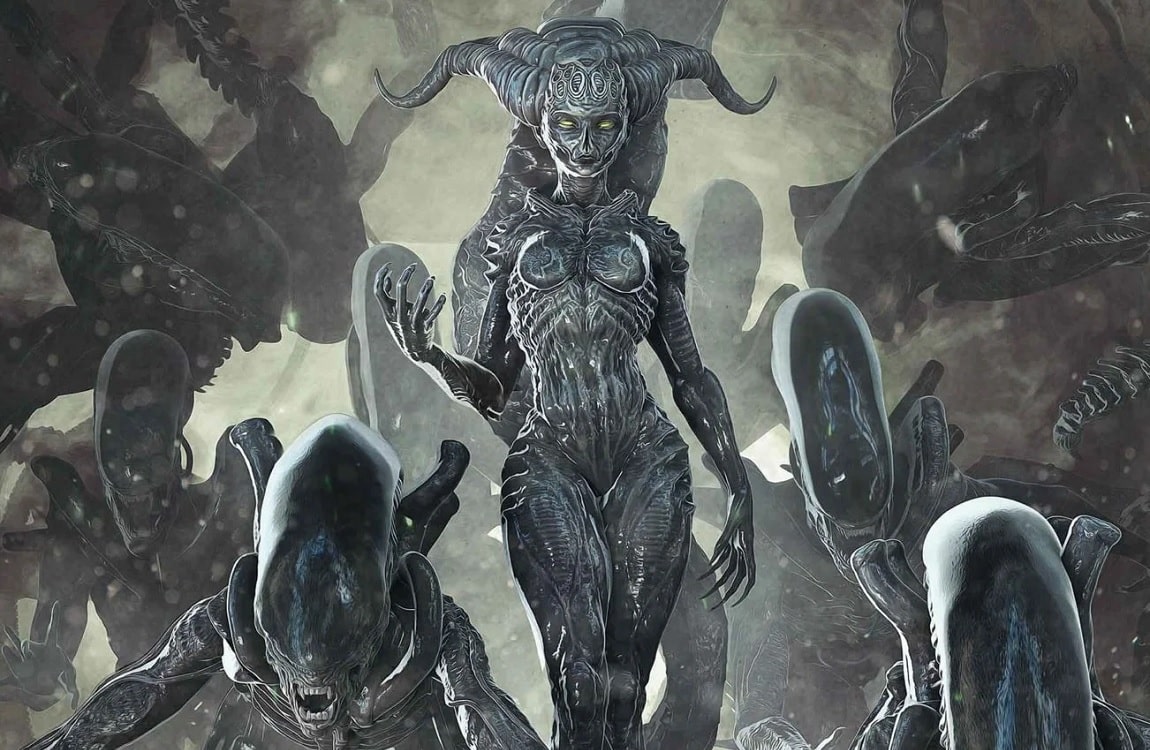
Marvel's Bloodline series featured another new Xenomorph type - a mysterious and godlike Xenomorph deity named "Woman in the Dark". This biomechanical female creature had goat-like horns and belonged to the Alien hive, but not as a Queen. Initially, she appeared only in the nightmares induced by facehugger in the main character, Gabriel Cruz, but others also claimed to have seen her. The Goddess was meant to symbolize the ultimate consequence of humanity's encounters with the Xenomorph species and was not merely a product of imagination. The Xenomorph Goddess might still have a bigger part to play in the ongoing Alien comic series.
Rare Xenomorph Types: Irradiated Xenomorph
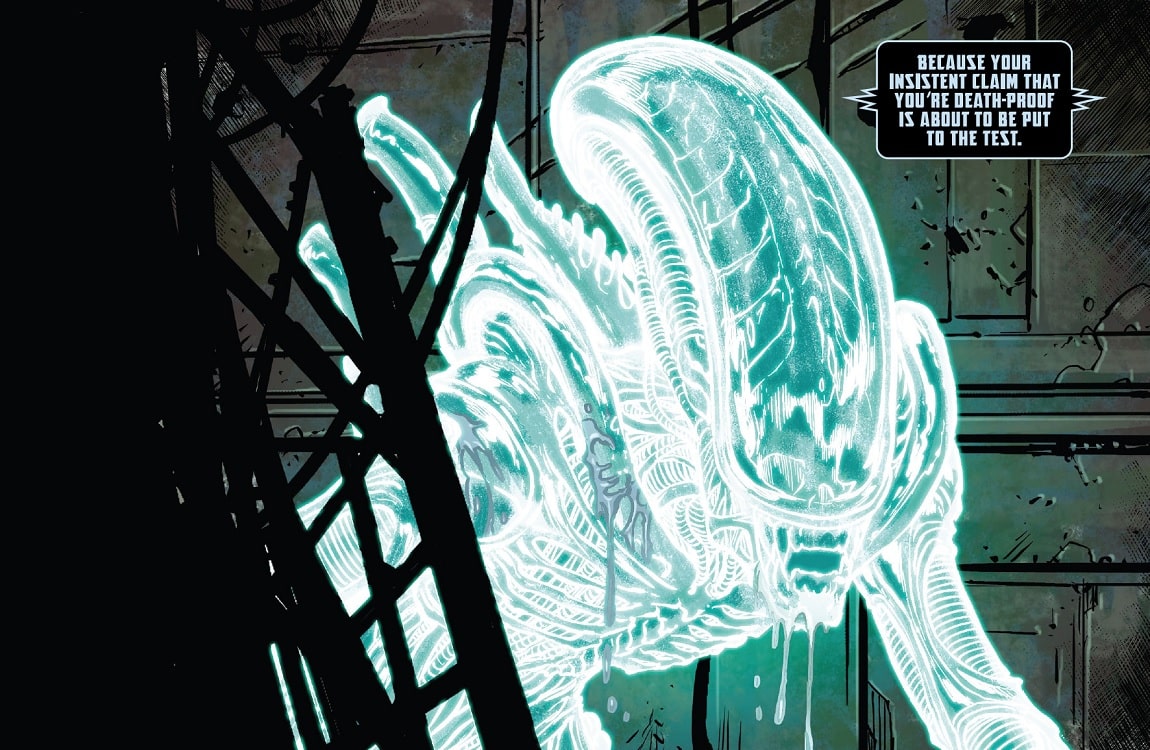
According to the Aliens: Aftermath comic, not all Xenomorphs were destroyed in the LV-426 atmosphere processor explosion. At least one of them survived and became mutated by the high radiation levels at the site. This irradiated Xenomorph had a white glow and its body acted like liquid nitrogen, freezing anything it touched. A group of investigative journalists visited the LV-426 site 35 years after the events of Aliens and came into contact with this special type of Alien. After it killed at least three members of the team, Cutter Vasquez (a cousin to Jenette Vasquez) fought the creature to a standstill and most likely they both perished.
Exotic Xenomorph Types: Aquatic Xenomorph
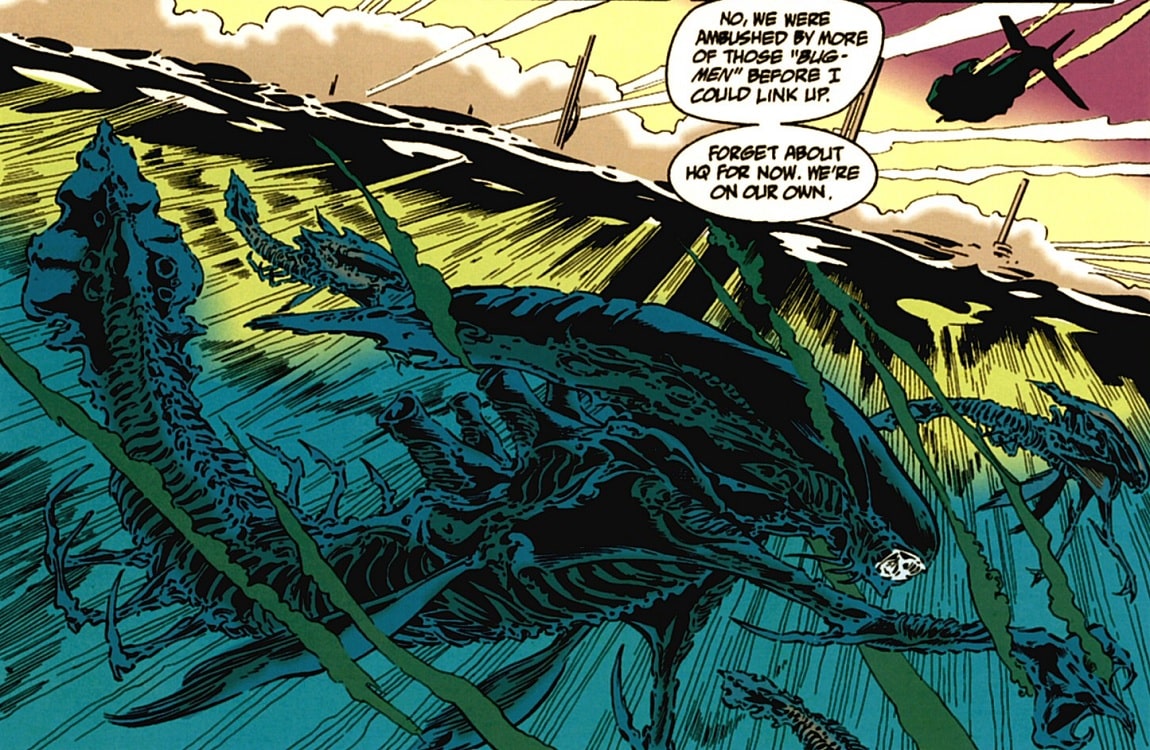
As established in Alien: Resurrection, the Xenomorphs are good swimmers and can stalk their prey successfully underwater. However, the Alien: Colonial Marines comic series introduced a new Alien type that was even more adapted to aquatic conditions. A USCM squad led by Lt. Henry encountered a swarm of aquatic Xenomorphs that harassed a colony outpost on Bracken's World. These creatures were the size of Praetorians but sported no legs and their lower body formed into a tail fan. They were blueish in color and had shorter dorsal tubes than regular Xenomorphs. The Aliens most likely evolved through the DNA reflex by facehuggers infecting aquatic creatures native to the planet.
Exotic Xenomorph Variants: Flying Xenomorph
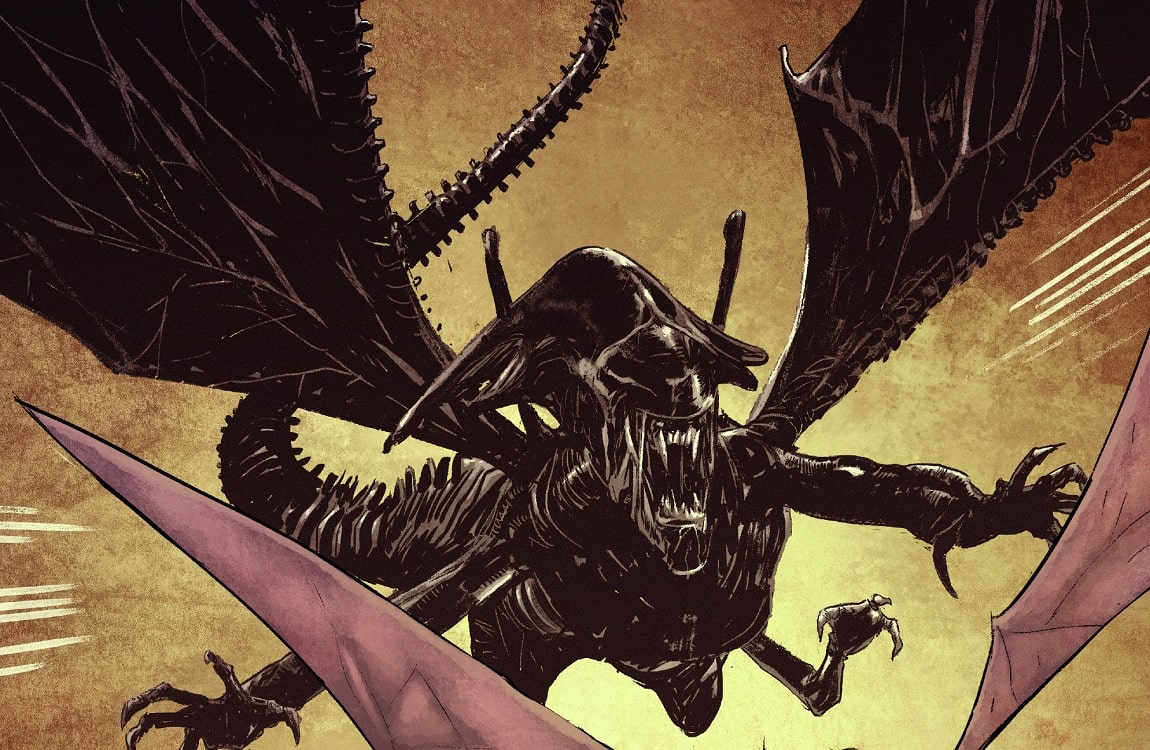
Flying Xenomorphs have appeared in different types of Expanded Universe material throughout the years. Kenner was the first to introduce a flying Alien Queen figure that came with a short Aliens: Space Marines comic book. The Queen had huge wings and resembled a giant bat, able to even harass a USCM dropship while in flight. Later on, Aliens: Extermination featured a flying Alien named the Alien Dragon that was accompanied by flying chestbursters. Finally, the Aliens/Vampirella comic book crossover had a chestburster born from Vampirella that gained her Vampire powers through the DNA reflex, growing bat-like wings.
Alternate Xenomorph Variants: Anchorpoint Hybrid
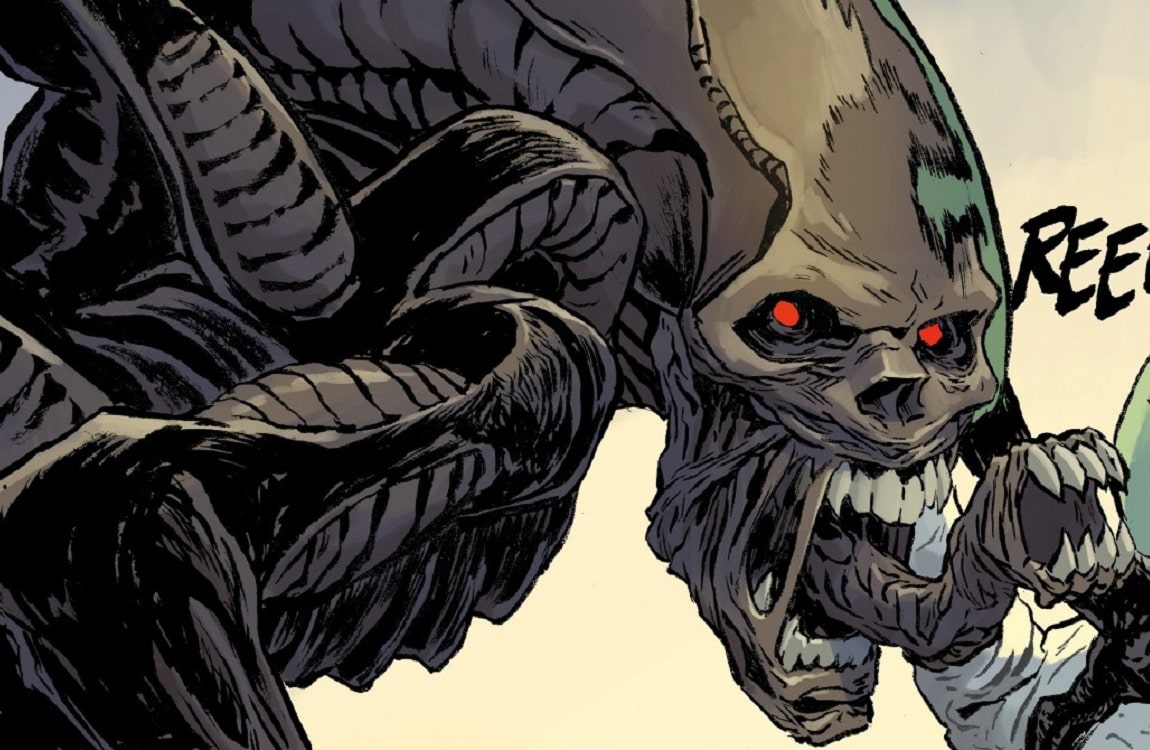
The Anchorpoint Hybrid Xenomorph only exists in the alternate version of Alien 3, an unused script written by cyberpunk mastermind William Gibson. The script was turned into a comic book series by Dark Horse. In the story, the Xenomorphs used an alternate way of reproduction, spreading by airborne spores in the huge space station called Anchorpoint. This beast burst out of the skin of Susan Welles, a member of the Weyland-Yutani weapons division. The hybrid had red eyes and a human-like nose. Later on, it got into a fight with a regular Xenomorph and was ripped in half, indicating its inferiority to the regular strain.
Alternate Xenomorph Variants: Albino Drone Xenomorph
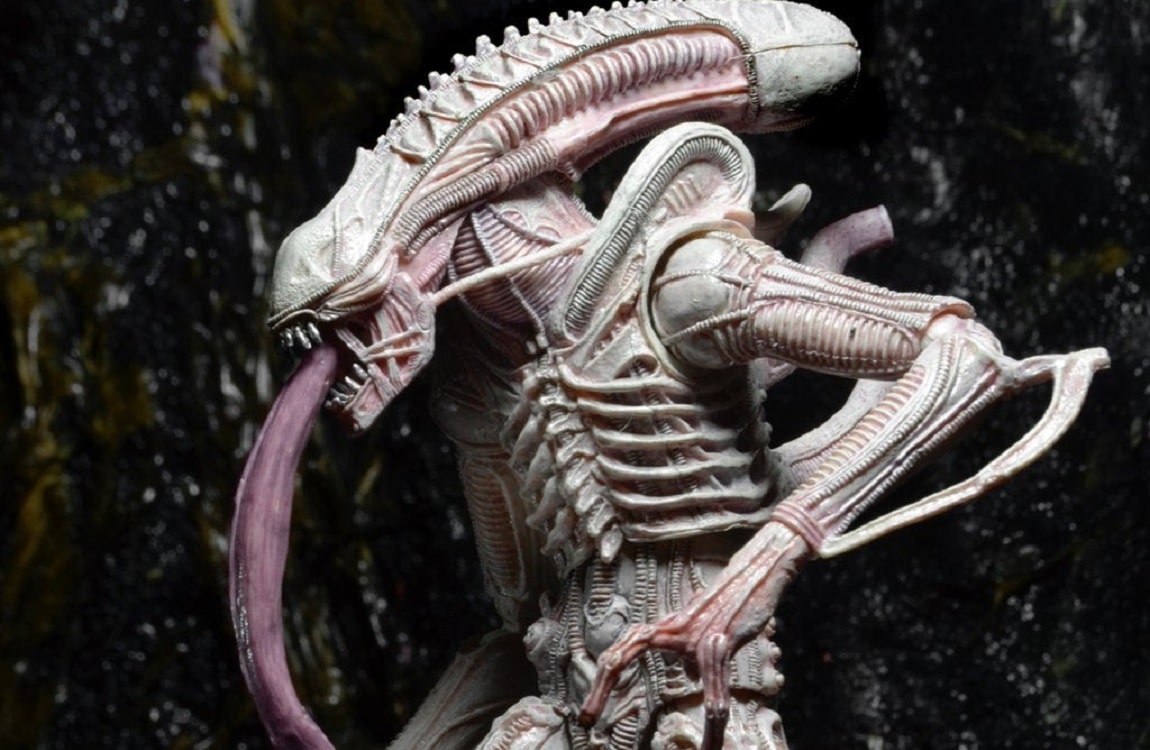
In the initial script draft of Aliens by James Cameron, Ripley encountered Albino drones in the Xenomorph hive when going to rescue Newt. These were slightly smaller types of Xenomorph, with white skin and a long pink tongue. The tongue was used to help build the hive - to mold the resin on the walls and to cocoon the victims. These white Xenomorphs were probably cut due to budget reasons and Cameron rewriting the script to be more focused. The concept was later canonized by NECA who released the albino drone Xenomorph figures, although their size was the same as regular drones.
Robotic Xenomorph: Xenoborg
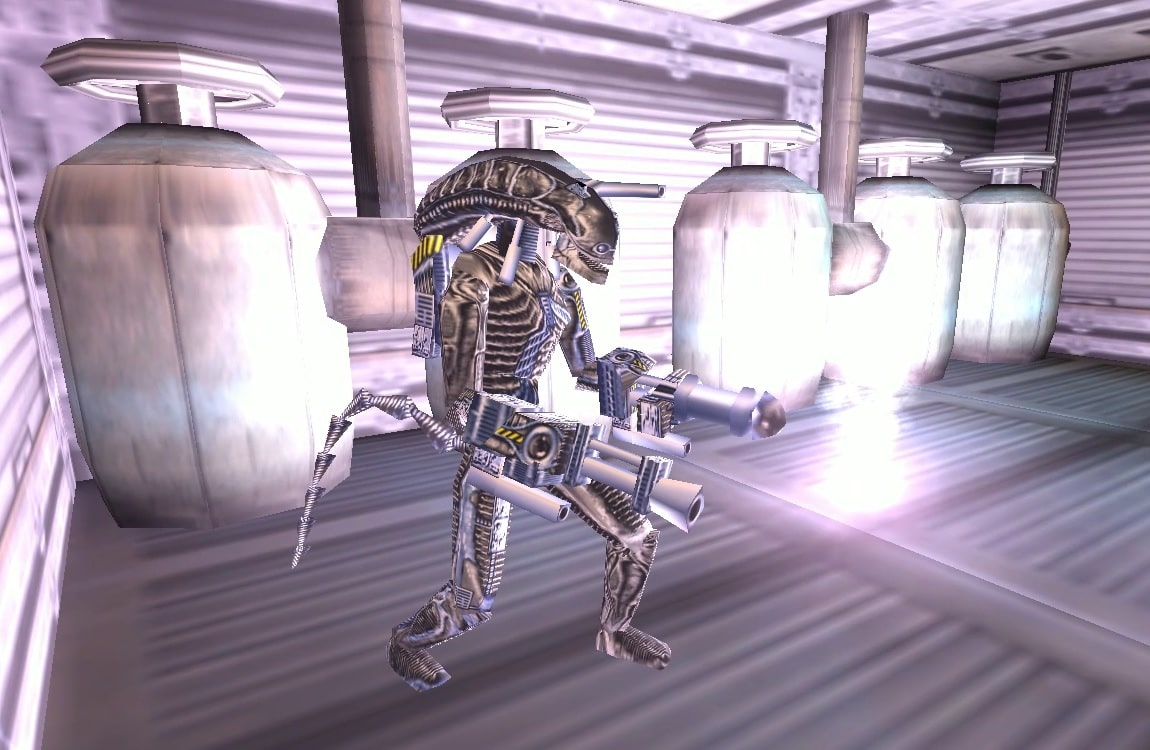
The Xenoborg represents an experimental creation by Weyland-Yutani and is one of the most peculiar types among Xenomorphs featured in the Alien video games. Primarily serving as a stationary defense unit, the Xenoborg's mobility is quite limited, and its intelligence is minimal. Nonetheless, its slow nature is compensated by the formidable arm-mounted twin lasers it possesses. While maintaining some characteristics of a traditional Xenomorph, such as acidic blood, the Xenoborg is enhanced with cybernetic augmentations. Its resilience is noteworthy, often requiring explosives or dismemberment through spear weapons for effective elimination. The Xenoborg's appearance is exclusive to the 1999 PC game "Aliens vs. Predator," where it is encountered infrequently in both the Colonial Marine and Predator storylines.
Pink Xenomorph
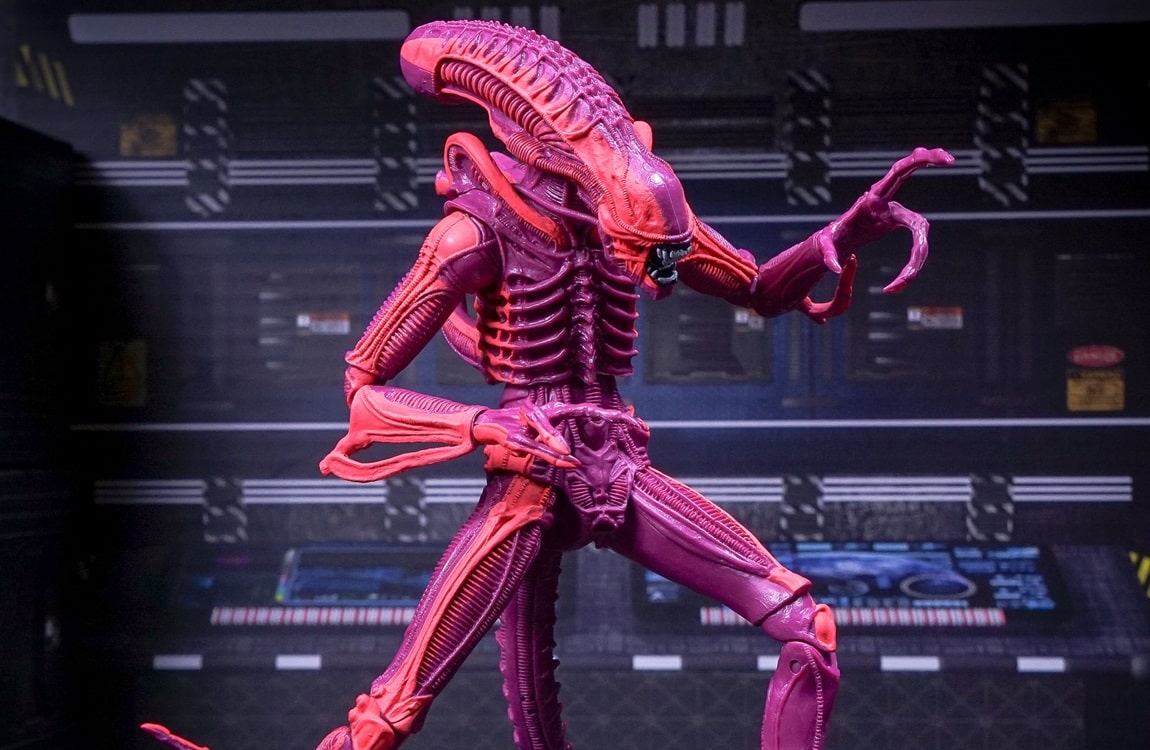
Xenomorphs come in many colors, the rarest and most exotic is perhaps the Pink Xenomorph. Appearing in the short but fun Aliens Arcade Game, the Pink Xenomorphs were the results of the radiation of the LV-426 Atmosphere Processor causing mutations in the Xenomorph hive. The creature's unique ability was to melt itself upwards through the floor, ambushing the player (either Ellen Ripley or Dwayne Hicks). Furthermore, a pink Xenomorph Egg appeared in Aliens: Kidnapped, but the resulting Chestburster was surprisingly not pink, but black instead (called the Goreburster).
Xenomorph Frog
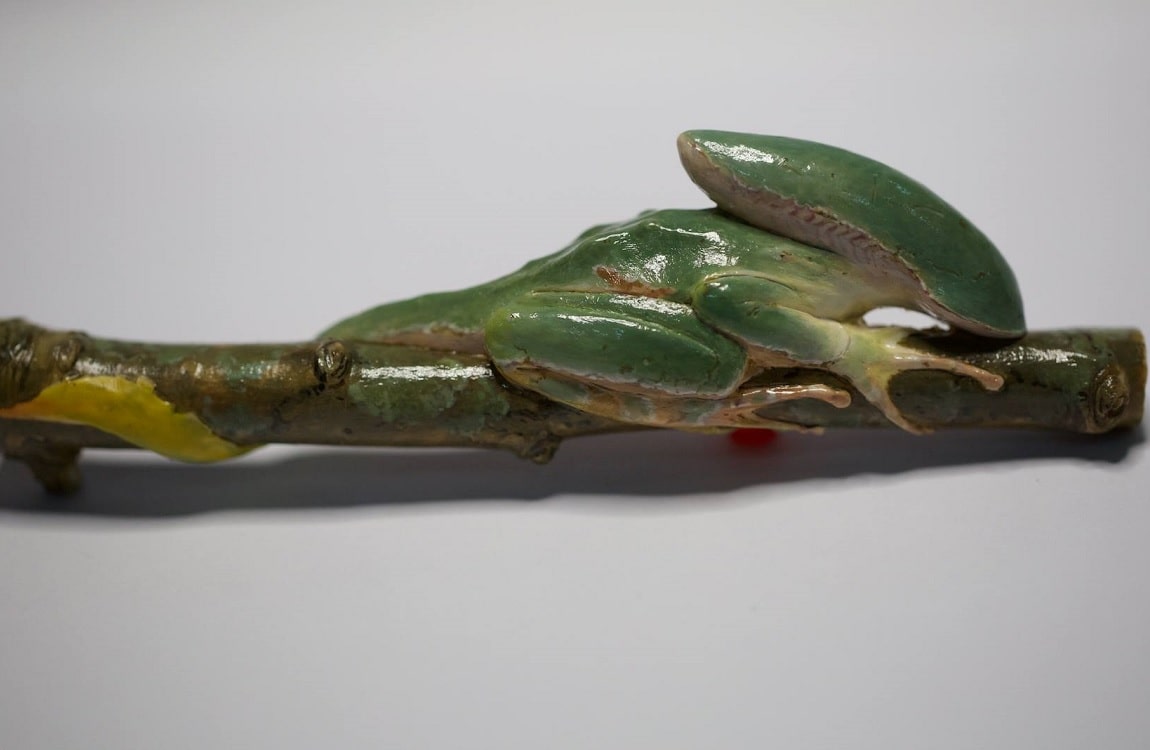
The Xenomorph frog is a non-canonical Xenomorph type that caused excitement a few years ago when pictures of Xenomorph statues created by Chinese artist Li Changchun were posted online. People had the mistaken belief that the pictures were of a real creature found in nature, which was of course, untrue. However, a Xenomorph frog variant could theoretically exist in the Alien universe, if a facehugger infected a big enough frog. Furthermore, the Black Goo mutagen could produce a similar effect if it spread among a frog colony, producing tiny Xenomoprhs. If a Mantis Alien (a figure by Kenner) already exists, so could a Frog Xenomorph.
Conclusion
The Xenomorph species is a fascinating and terrifying creature that has captured the imagination of fans for decades. From the eggs to the queens, each stage in the Alien lifecycle reveals different types of Xenomorphs with unique characteristics and abilities. The expanded universe has even more variants of these Aliens, each with its own lore and often convoluted backstory. Some of the most ridiculous Xenomorph types from the toy series were left out of the list. The sheer number of Xenomorphs, along with their deadly behavior, make them some of the most feared and iconic creatures in science fiction.

